T
The Indian Premier League, popularly known as the IPL, is one of the most exciting and lucrative cricket tournaments in the world. It was first launched in 2008 by the Board of Control for Cricket in India (BCCI) as a Twenty20 cricket tournament featuring eight teams representing different cities in India. Over the years, the tournament has grown in popularity, attracting some of the biggest names in cricket from around the world and turning into a global phenomenon.
One of the most exciting aspects of the IPL is the fierce competition between the teams, with each franchise vying for the coveted IPL trophy. The tournament follows a round-robin format, with each team playing a total of 14 matches in the league stage. The top four teams then qualify for the playoffs, which include two qualifier matches and an eliminator match before the final.
Over the years, several teams have emerged as top contenders for the IPL trophy. The Mumbai Indians, led by Rohit Sharma, are the most successful team in the tournament's history, having won the trophy a record five times. They first won the title in 2013 and have since gone on to win it four more times in 2015, 2017, 2019, and 2020.
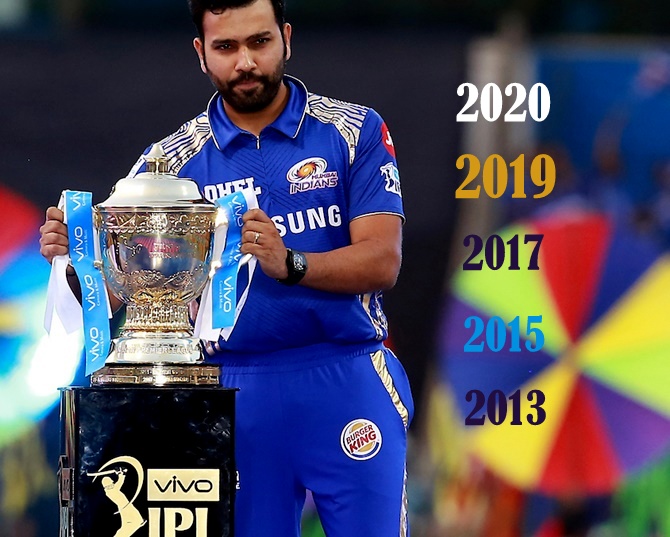
The Chennai Super Kings, led by MS Dhoni, are the second-most successful team in IPL history, having won the title three times in 2010, 2011, and 2018. The Kolkata Knight Riders, led by Eoin Morgan, and the Sunrisers Hyderabad, led by Kane Williamson, have both won the IPL title twice.
Other teams that have won the IPL trophy include the Rajasthan Royals, who won the inaugural IPL in 2008, and the Deccan Chargers, who won the tournament in 2009. The Royal Challengers Bangalore, Kings XI Punjab, and Delhi Capitals are the only teams to have reached the IPL final without winning the tournament.
Cricket is a sport that unites people across the world, and nowhere is this more evident than in the Indian Premier League or IPL. Every year, the IPL brings together some of the best cricketers from around the world to compete for the coveted IPL trophy. The tournament is a true spectacle, with millions of fans tuning in to watch the action unfold.

Over the years, several teams have emerged as strong contenders for the IPL title. The Mumbai Indians, led by Rohit Sharma, are the most successful team in the tournament's history, having won the trophy a record five times. Their performances have been consistently impressive, with the team displaying a formidable combination of strong batting, disciplined bowling, and exceptional fielding.
The Chennai Super Kings, led by MS Dhoni, has also been a dominant force in the IPL, winning the title three times. The team is known for its consistency and strong leadership, with Dhoni leading from the front and inspiring his teammates to perform at their best.
Other teams that have performed well in the IPL include the Kolkata Knight Riders, led by Eoin Morgan, and the Sunrisers Hyderabad, led by Kane Williamson. Both teams have won the IPL twice and have consistently been in contention for the title.
The IPL is not just a battle for glory; it is also a platform for young and upcoming players to showcase their talent. Many players who have performed well in the IPL have gone on to represent their national teams and make a name for themselves in the world of cricket.
The IPL has also had a significant impact on the economy, with the tournament generating huge revenues for the BCCI and its franchise owners. The tournament has also provided a boost to local economies, with businesses benefiting from increased tourism and spending during the tournament.
The IPL has revolutionized cricket in many ways. It has not only brought a new format to the game but also created a platform for young and upcoming players to showcase their talent. The league has also attracted some of the biggest names in world cricket, including the likes of Virat Kohli, Rohit Sharma, MS Dhoni, and AB de Villiers.
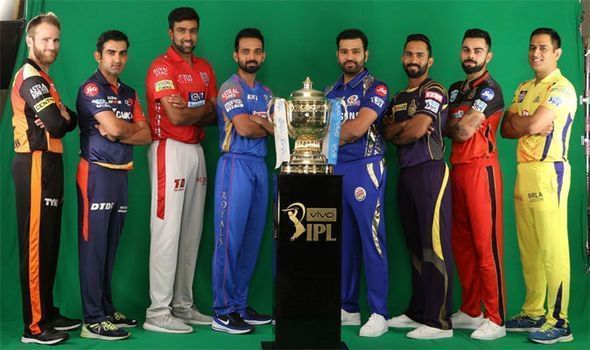
The IPL has also been a massive success commercially. It is one of the richest cricket leagues in the world, with teams being bought for millions of dollars. The league has also created employment opportunities for thousands of people, including players, coaches, support staff, and groundsmen.
However, the IPL has not been without its controversies. The league has been embroiled in match-fixing scandals, with several players and officials being banned for their involvement. The league has also faced criticism for its impact on the environment, with concerns raised over the use of plastic and the carbon footprint created by the tournament.
Despite these controversies, the IPL remains one of the most exciting and popular cricket tournaments in the world. It has created a new generation of cricket fans, who are passionate about the game and the league. The IPL has also created a legacy that will continue to inspire and influence cricket for generations to come.
Maa Katyayani is one of the nine forms of Goddess Durga, who is worshipped during the auspicious occasion of Navratri. Navratri is a nine-day festival celebrated in the Hindu religion, which is dedicated to worshipping the nine forms of Goddess Durga. The festival usually falls in the months of September or October, according to the Hindu calendar.
Maa Katyayani is believed to be the warrior goddess who rides a lion and is worshipped as the epitome of courage, power, and strength. The goddess is depicted with four arms, holding a sword, a lotus, and a mudra that symbolizes blessings and protection. She is often adorned with red clothes, and her complexion is said to be golden.

According to Hindu mythology, Maa Katyayani was born to a sage named Katyayan, who was an ardent devotee of Goddess Durga. As per the legend, the sage performed rigorous penance to please the goddess, and in return, she appeared before him in the form of his daughter. She is also believed to have manifested to slay the demon Mahishasura.
The story of Maa Katyayani goes back to the time when the demon Mahishasura had defeated the gods and taken control of the universe. The gods, unable to defeat the demon, approached Lord Vishnu for help, who advised them to seek the help of Goddess Parvati. Parvati, in response to their plea, took the form of Maa Katyayani to fight Mahishasura.
Maa Katyayani is depicted as a fierce warrior goddess, riding a lion and carrying weapons such as a sword, trident, and lotus. She is also known as the goddess of love and devotion, as she is believed to help devotees in finding their soulmates and overcome obstacles in their love lives.
During Navratri, devotees perform puja (worship) of Maa Katyayani, offering her flowers, fruits, and sweets. They also recite her mantras and sing hymns in her praise. It is believed that worshipping Maa Katyayani during Navratri helps in removing obstacles and achieving success in life.
Apart from Navratri, Maa Katyayani is also worshiped on Tuesdays and Fridays, as these are considered auspicious days for her worship. Devotees fast and offer prayers to Maa Katyayani on these days, seeking her blessings for a happy and prosperous life.
The worship of Maa Katyayani is believed to grant courage, strength, and the ability to overcome obstacles. Devotees offer prayers, perform rituals, and observe fasts during the nine-day festival of Navratri. They also offer flowers, sweets, and other items to the goddess and seek her blessings.
Maa Katyayani is also associated with the Manipura Chakra, which is believed to be the center of willpower and self-esteem. The worship of Maa Katyayani is said to activate this chakra, which in turn helps in developing self-confidence and the ability to make decisions
In conclusion, Maa Katyayani is a powerful and revered goddess in Hindu mythology, worshipped for her strength, courage, and love. Her devotees seek her blessings for success in all aspects of life, including love, marriage, and career. Her worship during Navratri and on auspicious days is believed to bring happiness, prosperity, and fulfillment to one's life.


As artificial intelligence (AI) continues to advance, its impact on various industries is becoming increasingly apparent. From healthcare and finance to manufacturing and education, AI has the potential to revolutionize the way we work and live. In this blog post, we will explore how AI is likely to affect different industries in the future.
-
Healthcare: AI has already made significant strides in the healthcare industry, from improving diagnostics to drug discovery. In the future, AI-powered devices and algorithms could help physicians make more accurate diagnoses and treatment recommendations. AI could also help to identify patients at risk of developing certain conditions, allowing for earlier interventions and better outcomes.
-
Finance: AI is already being used in the finance industry to detect fraud, analyze market trends, and automate routine tasks. In the future, AI could play an even greater role in the industry, from personalized financial advice to fully automated investing.
-
Manufacturing: AI is already being used in manufacturing to improve efficiency and reduce costs. In the future, AI-powered robots could take over many of the tasks currently performed by humans, leading to greater productivity and cost savings.
-
Education: AI has the potential to transform education by personalizing learning experiences and providing more effective feedback to students. AI-powered tutoring systems could help students learn at their own pace and provide targeted support for areas where they are struggling.
-
Transportation: AI is already being used in the transportation industry to improve safety and efficiency. In the future, autonomous vehicles could transform the way we travel, from reducing traffic congestion to improving road safety.
-
Retail: AI-powered chatbots and recommendation engines are already being used in retail to provide personalized shopping experiences for customers. In the future, AI could play an even greater role in the industry, from predicting consumer trends to optimizing supply chain management.
-
Energy: AI has the potential to transform the energy industry by optimizing energy consumption, reducing waste, and improving the efficiency of renewable energy sources.
In conclusion, the impact of AI on different industries is likely to be significant in the future. While there are potential benefits, there are also concerns about the potential job loss and the ethical implications of AI. However, if managed correctly, AI has the potential to revolutionize the way we live and work, leading to greater efficiency, productivity, and innovation in a wide range of industries.
Read More: Boost Your Ranking: Top SEO Tools | How to make Android Expense Monitor Application with MVVM - Part 1 (of 4)

Skandamata is a Hindu goddess who is worshipped on the fifth day of Navratri, a nine-day Hindu festival that celebrates the triumph of good over evil. Skandamata is the mother of Skanda or Kartikeya, the Hindu god of war, and is a form of Goddess Durga.
Skandamata is depicted as a four-armed goddess, holding a lotus flower and a bell in her upper hands, while her lower hands are in the Abhaya Mudra (gesture of fearlessness) and the Varada Mudra (gesture of granting boons). She rides on a lion, which represents power and courage. and her complexion is golden, signifying prosperity.

According to Hindu mythology, Skandamata was born to Lord Vishnu as his daughter in the form of Shakti. She married Lord Shiva and gave birth to Lord Skanda. Skandamata is considered to be a benevolent and compassionate goddess who blesses her devotees with courage, strength, and success. She is also known for her maternal love and protection.
Worshipping Skandamata during Navratri is believed to bring peace, prosperity, and happiness to one's life. Devotees offer her flowers, fruits, sweets, and other offerings to seek her blessings. Reciting Skandamata's mantra, "Om Devi Skandamatayai Namah," is also considered auspicious and helps in attaining spiritual and material benefits.
Skandamata is a symbol of motherhood and represents the divine feminine energy in Hinduism. She reminds us of the importance of maternal love and protection in our lives. By worshipping Skandamata, we can connect with our inner strength and overcome our fears and obstacles.
Skandamata is considered a very powerful goddess, and her worship is believed to bring peace, prosperity, and happiness to her devotees. It is said that worshipping Skandamata on the fifth day of Navratri can help overcome all kinds of difficulties and obstacles in life.
To perform Skandamata puja, devotees usually clean their homes and decorate their puja rooms with flowers and rangolis. They offer lotus flowers, fruits, and sweets to the goddess and chant mantras and hymns in her praise.
Skandamata is also associated with the Svadhisthana chakra, which is located at the base of the spine and is associated with emotions, creativity, and sensuality. It is believed that meditating on Skandamata and focusing on this chakra can help balance emotions and improve creativity.
In addition to her role as a mother and protector, Skandamata is also believed to have the power to destroy negative energy and protect her devotees from harm. It is said that worshipping her with devotion and faith can help them overcome all kinds of obstacles and lead to success in all areas of life.
The significance of Skandamata can be traced back to ancient Hindu texts such as the Devi Mahatmya, which describes the various forms of the goddess Durga. Skandamata is also mentioned in the Skanda Purana, which is dedicated to Lord Kartikeya.
In conclusion, Skandamata is an important deity in Hindu mythology and is worshipped with great devotion and reverence during the Navratri festival. She is a symbol of motherhood and represents the power of love, compassion, and protection. By worshipping Skandamata, we can gain her blessings and guidance in our lives.

Mahagauri is one of the nine forms of Goddess Durga, worshipped during the auspicious occasion of Navratri. She is the eighth avatar of the Hindu goddess Durga and is known for her purity and serenity. Mahagauri is believed to be the epitome of peace, prosperity, and good luck. Her name "Mahagauri" is derived from two Sanskrit words, "Maha," which means "great," and "Gauri," which means "white," symbolizing purity.
According to Hindu mythology, Mahagauri's name and form came about after Parvati, the wife of Lord Shiva, performed severe penance for several years to attain him as her husband. Due to the intensity of her penance, her skin became dark, and she came to be known as Kali (meaning black). However, Lord Shiva blessed her and washed her with the holy waters of the Ganges River, restoring her original fair complexion and purity. It is believed that by worshipping Mahagauri, one can attain spiritual purity and the blessings of the divine mother.
Devotees of Mahagauri observe fasts and perform puja (worship) during the eight days of Navratri. On the eighth day, they offer white clothes, flowers, and sweets to the goddess and sing hymns and devotional songs in her honor. The puja rituals conclude with the 'visarjan, or immersion, of the goddess's idol in a nearby water body.
Mahagauri is depicted as a beautiful woman with four arms, riding on a white bull or a lion. She holds a trident and a damaru (a small drum) in her two hands, while the other two hands are in the mudras of "veranda" and "Abhaya," symbolizing her blessings and fearlessness, respectively. Her serene and gentle nature is depicted through her attire, which is a simple white sari with no jewelry or heavy adornments.
Mahagauri is worshipped on the eighth day of Navratri, and her devotees seek her blessings for purity, peace, and prosperity. It is believed that worshipping Mahagauri on this day removes all the impurities and sins from one's life, and the devotee becomes pure, both spiritually and physically. Mahagauri is also worshipped during the festival of Durga Puja, along with other forms of Durga, by Hindus all over the world.
Mahagauri is worshipped on the eighth day of Navratri, which is also known as Ashtami. It is believed that worshipping her can help in purifying the mind, body, and soul. Devotees offer white flowers, coconut, and sweets to the goddess as a symbol of their devotion.
Mahagauri is also associated with the planet Rahu, which is considered a malefic planet in Hindu astrology. It is believed that worshipping her can help reduce the negative effects of Rahu and bring success and prosperity.
In conclusion, Mahagauri is a revered form of Goddess Durga and represents purity, calmness, and spiritual enlightenment. Her worship during Navratri can help one attain inner peace, overcome obstacles, and achieve success in life. By invoking her blessings, one can lead a life filled with happiness, prosperity, and spiritual fulfillment.

Writing a blog or website content that is both plagiarism-free and SEO-friendly is crucial in today's digital age. A plagiarism-free content ensures that your work is original and not copied from any other sources. On the other hand, SEO-friendly content is optimized for search engines to improve your website's ranking and increase traffic.
Here are some tips on how to write plagiarism-free and SEO-friendly content:
-
Research and Gather Information: Start by researching your topic and gathering information from credible sources. This will help you to have a better understanding of the topic, and you can use the information to create your unique content.
-
Create an Outline: Create an outline of your blog or website content before starting to write. This will help you to organize your ideas and ensure that you cover all the necessary points.
-
Use Plagiarism Checker Tools: Always use plagiarism checker tools to ensure that your content is original. There are many free online tools available that can help you to check for plagiarism, such as Grammarly, Turnitin, Copyscape, etc.
-
Use Proper Citation: If you have to use any information or quote from other sources, make sure to give proper citation and credit to the original source. This will help you to avoid plagiarism and also improve the credibility of your content.
-
Use Keywords and Phrases: Use relevant keywords and phrases in your content to optimize it for search engines. This will help your website to rank higher in search results and attract more traffic.
-
Write in Simple Language: Use simple language and avoid using complex jargon or technical terms that may confuse your readers. Keep your content easy to read and understand.
-
Use Headings and Subheadings: Use headings and subheadings to break down your content into smaller sections. This will make it easier for your readers to read and understand your content, and also help search engines to crawl your content more efficiently.
-
Use Visuals: Use relevant images, videos, and infographics to make your content more engaging and visually appealing. This will help to keep your readers engaged and also improve the overall user experience.
Read More: Here are the top 5 plagiarism checker sites | How to Make Money Online with ChatGPT
In conclusion, writing plagiarism-free and SEO-friendly content requires effort and attention to detail. By following these tips, you can create content that is original, informative, and optimized for search engines, which can help to drive traffic to your website and increase engagement with your audience.

Artificial intelligence (AI) has been one of the most transformative technologies of the 21st century. From healthcare to finance, retail to transportation, AI has disrupted traditional business models and has the potential to revolutionize the way we live and work. In this blog post, we will explore the impact of AI on diverse industries, the opportunities it presents, and the challenges it poses.
Healthcare
One of the most significant impacts of AI has been in the healthcare industry. AI-powered diagnostic tools can analyze medical data with unprecedented accuracy and speed, leading to more accurate diagnoses and more effective treatments. AI can also help healthcare providers manage patient data more efficiently and improve patient outcomes. Additionally, AI-powered robots can perform surgeries with greater precision, reducing the risk of human error.
Despite these benefits, the use of AI in healthcare has raised concerns about patient privacy and the ethical implications of using AI to make life-or-death decisions. Additionally, the adoption of AI in healthcare requires significant investment in technology and training, which can be a barrier to entry for some healthcare providers.
Finance
AI is also having a significant impact on the finance industry. With the help of AI, financial institutions can analyze vast amounts of data and make more informed investment decisions. AI-powered chatbots can also provide personalized financial advice and customer service, improving the customer experience. Additionally, AI can help detect fraudulent activity more quickly and accurately. However, the use of AI in finance also raises concerns about privacy and security. Financial institutions must ensure that the personal and financial data they collect is protected from cyber threats. Additionally, the use of AI in finance could lead to job losses as AI-powered systems take over tasks traditionally performed by humans.
Retail
AI is transforming the retail industry by improving the customer experience and streamlining operations. AI-powered chatbots can provide personalized customer service, while AI-powered recommendation engines can suggest products that are tailored to each customer's preferences. Additionally, AI can help retailers manage inventory more efficiently, reducing waste and improving profitability. However, the use of AI in retail has also raised concerns about privacy and security. Retailers must ensure that the personal and financial data they collect is protected from cyber threats. Additionally, the adoption of AI in retail could lead to job losses as AI-powered systems take over tasks traditionally performed by humans.
Transportation
AI is also having a significant impact on the transportation industry. AI-powered self-driving cars can reduce traffic accidents and improve traffic flow. Additionally, AI-powered logistics systems can help transportation companies optimize routes and improve efficiency. However, the use of AI in transportation has also raised concerns about safety and privacy. Self-driving cars must be programmed to make ethical decisions in the event of an emergency, and transportation companies must ensure that the personal data they collect is protected from cyber threats.
Opportunities of AI in Diverse Industries
The impact of AI on diverse industries has created numerous opportunities. Some of these opportunities include:
1. Increased efficiency: AI-powered systems can help businesses operate more efficiently, reducing costs and improving profitability.
2. Enhanced customer experience: AI-powered chatbots and recommendation engines can provide personalized customer service, improving the customer experience.
3. Improved decision-making: AI can analyze vast amounts of data and provide insights that humans may not be able to see, leading to more informed decision-making.
4. Enhanced safety: AI-powered systems can improve safety in industries such as healthcare and transportation, reducing the risk of human error.
Challenges of AI in Diverse Industries
The adoption of AI in diverse industries has also created numerous challenges. Some of these challenges include:
1. Privacy and security: The use of AI requires the collection and storage of vast amounts of personal and financial data, which must be protected from cyber threats.
2. Ethical concerns: The use of AI to make life-or-death decisions raises ethical concerns, as does the potential for AI to automate jobs and displace workers.
3. Regulation: As AI becomes more prevalent, there is a need for regulation to ensure that it is used responsibly and ethically.
4. Investment and training: The adoption of AI requires significant investment in technology and training, which can be a barrier to entry for some businesses and industries.
5. Bias and fairness: AI algorithms can be biased, leading to unfair or discriminatory outcomes. It is important to ensure that AI is trained on diverse datasets and tested for bias to mitigate these risks.
The Future of AI in Diverse Industries
The future of AI in diverse industries is bright, as advances in technology and increased adoption lead to new and innovative applications. Some of the trends that we can expect to see in the future include:
1. Increased automation: As AI becomes more sophisticated, it will be able to automate more tasks and processes, leading to increased efficiency and cost savings.
2. Enhanced personalization: AI-powered recommendation engines will become even more personalized, providing tailored product and service suggestions to each individual customer.
3. More advanced healthcare applications: AI-powered diagnostic tools will become even more accurate and will be able to detect diseases at an earlier stage, leading to better patient outcomes.
4. Improved sustainability: AI-powered systems will help businesses operate more sustainably, reducing waste and minimizing their environmental impact.
5. Expanded use of AI in emerging industries: As new industries emerge, we can expect to see AI being used in innovative ways to solve new and unique problems.
Challenges and Solutions for Future AI Development
As AI continues to evolve and becomes more prevalent, new challenges will emerge. To ensure that the benefits of AI are maximized and the risks are mitigated, it is important to address these challenges proactively. Some of the challenges and potential solutions include:
1. Ensuring data privacy and security: Businesses and industries must ensure that personal and financial data is protected from cyber threats. This can be achieved through the use of encryption and other security measures.
2. Ensuring fairness and avoiding bias: AI algorithms must be trained on diverse datasets to avoid bias and ensure that outcomes are fair and equitable. Additionally, algorithms must be tested for bias and adjusted as necessary.
3. Addressing ethical concerns: The use of AI to make life-or-death decisions raises ethical concerns, as does the potential for AI to automate jobs and displace workers. Businesses and industries must address these concerns proactively, through the development of ethical guidelines and the adoption of responsible AI practices.
4. Investing in technology and training: To fully realize the benefits of AI, businesses, and industries must invest in technology and training to ensure that employees are equipped to work with AI-powered systems.
5. Encouraging collaboration and regulation: To ensure that AI is used responsibly and ethically, collaboration between businesses, industries, and policymakers is essential. Additionally, regulation can help ensure that AI is used in a way that benefits society as a whole.
In conclusion, AI is having a significant impact on diverse industries, and its potential for future applications is enormous. While AI presents challenges related to privacy, ethics, and regulation, these challenges can be addressed through proactive measures such as encryption, bias testing, and ethical guidelines. By investing in technology and training, and encouraging collaboration and regulation, businesses and industries can harness the full potential of AI to improve efficiency, enhance customer experiences, and solve new and unique problems.

The climactic movie in the Avengers series is an irresistible blend of action and comedy, guaranteeing a sugar rush of delirious enjoyment
he previous Avengers movie, Infinity War, stunned believers and unbelievers alike with its sheer stupendous scale, and that devastating ending in which the evil Thanos appeared to have gained victory by getting hold of all six of the Infinity Stones, causing a crumbling-to-dust of many key players: a terrible cosmic loss, irreparable, irreversible, surely?
We were of course promised wild new surprises with this colossal climactic movie in the Marvel Cinematic Universe, written by Christopher Markus and Stephen McFeely and directed by the Russo brothers, Joe and Anthony. But would these surprises be .... new ways of coming to terms with the unchangeable disaster? Unexpected coping strategies? Novel means of simply accepting the Avengers’ stunningly permanent defeat?

Or could it be … something else? Paul Rudd, who plays Ant-Man, was challenged on TV about the possibility of his character shrinking to a tiny size, flying into some convenient orifice of the evil Thanos, and then grossly enlarging himself to make the great villain go splat like Mr. Creosote. Rudd declined to be drawn.
Well, I won’t disclose how things progress here, other than to say it allows the main players to revisit some of the scenes of their most spectacular franchise triumphs. And I have to admit, in all its surreal grandiosity, in all its delirious absurdity, there is a huge sugar rush of excitement to this mighty finale, finally interchanging with euphoric emotion and allowing us to say poignant farewells.

In chess, an “endgame” sees relatively few pieces on the board – but of course, this film is much more heavily populated. Tony Stark (Robert Downey Jr) is floating, desolately, in space, staring extinction in the face. Hawkeye (Jeremy Renner) confronts the loss of his family – a rather eerie, challengingly downbeat opening scene. Steve Rogers, formerly Captain America (Chris Evans) is helping others deal with their awful sense of cosmic grief. Rhodey (Don Cheadle) and Black Widow (Scarlett Johansson) are grimly getting on things. Captain Marvel (Brie Larson) is a vivid new presence in everyone’s lives.
And change is the keynote. Bruce Banner (Mark Ruffalo) has found a way to co-exist as a gentle human intellectual and a green monster. He is now half-man, half-hulk (mulk?) and is now reconciled to a new twilight of celebrity, accepting selfie opportunities with kids.

But Thor (Chris Hemsworth) is a worry. The great catastrophe has caused him to retreat to New Asgard, where he has put on an enormous amount of weight and morosely obsessed with beer and video games. It is a very funny performance from Hemsworth, emphasising that he is first among equals with the Avengers when it comes to comedy. Other people get funny lines as well, and the words “Mungo Jerry” gets one of the biggest laughs of the film.

But part of this movie is about how Thor comes to terms with the memory of his mother, Frigga (Rene Russo), and also in fact how Tony Stark achieves closure on the subject of his dad, Howard (John Slattery). And there are many more characters and subordinate narrative arcs to absorb. The poster is not an infallible guide. It is, as ever, a huge intricately detailed and interlocking mosaic of figures within that strange Avengers universe, which uniquely (and bizarrely) combines both the mythic and the contemporary – and which is here the stage for a Tolkienian quest.
Avengers: Endgame is entirely preposterous and, yes, the central plot device here does not, in itself, deliver the shock of the new. But the sheer enjoyment and fun that it delivers, the pure exotic spectacle, are irresistible, as is its insouciant way of combining the serious and the comic. Without the comedy, the drama would not be palatable. Yet without the earnest, almost childlike belief in the seriousness of what is at stake, the funny stuff would not work either. As an artificial creation, the Avengers have been triumphant, and as entertainment, they have been unconquerable.

How to Improve Your Sleep: 20 Tips for a Better Night's Rest
Sleep is essential for our physical and mental health. When we don't get enough sleep, we're more likely to experience fatigue, difficulty concentrating, mood swings, and even health problems like obesity and heart disease.
The good news is that there are things you can do to improve your sleep quality.
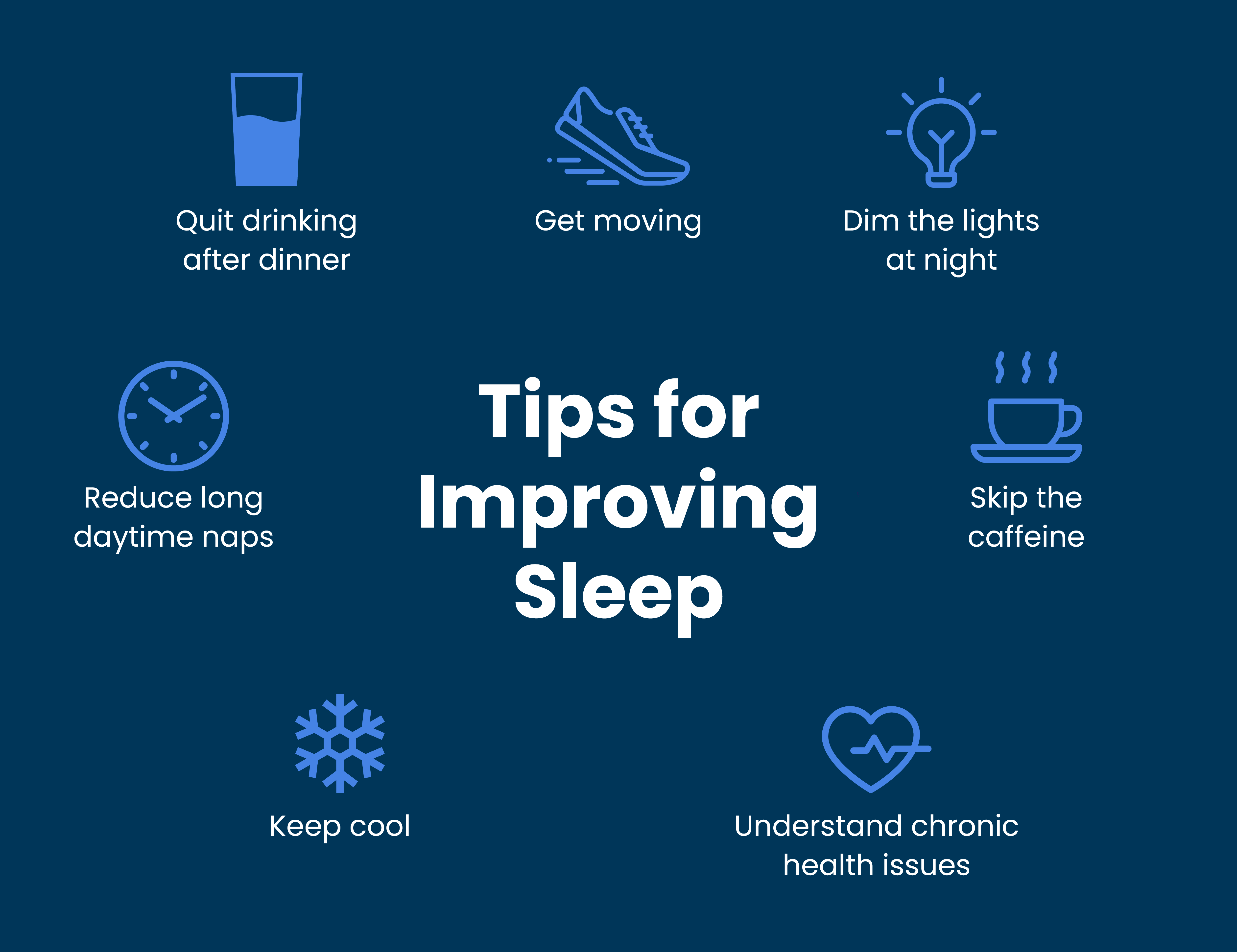
Here are 20 tips to help you get a better night's rest:
- Establish a regular sleep schedule and stick to it as much as possible, even on weekends. This will help to regulate your body's natural sleep-wake cycle.
- Create a relaxing bedtime routine. This could include taking a warm bath, reading a book, or listening to calming music. Avoid watching TV or using electronic devices in the hour before bed, as the blue light emitted from these devices can interfere with sleep.
- Make sure your bedroom is dark, quiet, and cool. Darkness helps to promote the production of melatonin, a hormone that helps to regulate sleep. Noise and light can disrupt sleep, so make sure your bedroom is as dark and quiet as possible. A cool temperature is also ideal for sleep.
- Avoid caffeine and alcohol before bed. Caffeine and alcohol can both interfere with sleep. Caffeine is a stimulant that can make it difficult to fall asleep, while alcohol can disrupt sleep later in the night.
- Get regular exercise. Exercise can help to improve sleep quality, but it's important to avoid exercising too close to bedtime. Aim to finish exercising at least 3 hours before bed.
- Nap during the day if you need to, but keep naps short (30 minutes or less). Long naps can make it harder to fall asleep at night.
- If you can't fall asleep after 20 minutes, get out of bed and do something relaxing until you feel tired. Lying in bed awake can make it harder to fall asleep.
- See a doctor if you have a sleep disorder. If you've tried the tips above and you're still having trouble sleeping, talk to your doctor. There may be an underlying medical condition that's interfering with your sleep.
Here are some additional tips for improving your sleep:
- Make sure your mattress and pillows are comfortable. If you're not comfortable, you're less likely to get a good night's sleep.
- Avoid eating heavy meals or drinking too much fluids before bed. This can make it difficult to fall asleep.
- Go to bed and wake up at the same time each day, even on weekends. This will help to regulate your body's natural sleep-wake cycle.
- Create a relaxing environment in your bedroom. This could include using blackout curtains, earplugs, or a fan to block out noise and light.
- Make sure your bedroom is at a comfortable temperature. Most people find that a cool temperature (between 60 and 67 degrees Fahrenheit) is ideal for sleep.
- Get regular exercise. Exercise can help to improve sleep quality, but it's important to avoid exercising too close to bedtime. Aim to finish exercising at least 3 hours before bed.
- See a doctor if you have a sleep disorder. If you've tried the tips above and you're still having trouble sleeping, talk to your doctor. There may be an underlying medical condition that's interfering with your sleep.
Following these tips can help you improve your sleep quality and get a better night's rest. However, it's important to find what works best for you and to experiment with different techniques. The most important thing is to find a system that you can stick with and that helps you achieve your sleep goals.

Click on the desired partition and delete the partition.
Now click on Freed Disk (which you deleted earlier)
and click on +.
Now we will create 3 partitions by this freed Partition.
The root is the area where Ubuntu will install.
swap is the virtual memory (size should double of RAm size).
home is the user's storage area, all downloads, and application installations will store here.
We still can use windows data in Ubuntu but not vice versa.
Now click + to start making these partitions.
Create the root directory (15 GB is good). (Input is Typed as MB, Make sure you converted to MB).
Now create a swap area (double of your RAM is good, 8000MB is best).
Create home partition Recommended to give all free space.
Step 4 - Follow the on-screen instructions.
After install successful, Ubuntu will ask you to Restart.
Unplug your USB and click Restart.
Enjoy Ubuntu.
Note - If windows are also installed, On startup, you will be asked to choose an operating system.
Fix - If you don't find the windows option on startup, Continue with ubuntu and open Terminal, and type this :
Enjoy Linux's Ubuntu the Open Source Operating System.😃😃

Want to buy a sleek, stylish, business style yet Gaming Oriented Laptop?
Well your search comes to an end now, HP has Launched its Ryzen series, and Not Gonna Lie HP is the most durable, reliable brand in the market.
I personally am using HP laptops for the past 10 years and not a single complaint whether about the software or the hardware.
The laptop which we are going to discuss today is HP 14s-fr0012AU. I will list down all the features, pros, and cons of buying a Ryzen laptop vs an intel laptop, and also last but not least: A Video Review.
Image Courtesy: Amazon
Processor: AMD Ryzen 5 3450U (2.1 GHz base clock, up to 3.5 GHz max boost clock, 4 MB L3 cache, 4 cores)
Operating System: Pre-loaded Windows 10 Home Single Language | Pre-Loaded Microsoft Office 2019
Display: 14 -inch FHD, IPS, micro-edge, brightview | Brightness: 250 nits | Screen Resolution: 1920 x 1080
Memory & Storage: 8 GB DDR4-2400 SDRAM (1 x 8 GB) & Expandable Up to 16 GB | Storage: 512GB PCIe NVMe SSD
Design & battery: Laptop weight: 1.46 kg | Battery life mixed usage = Up to 7 hours and 30 minutes | In the Box: Laptop, Battery, User Manual, and charger
Graphics: AMD Radeon Vega 8 Graphics
Camera & Microphone: HP True Vision 720p HD camera with integrated dual array digital microphones
Ports: 1 SuperSpeed USB Type-C (5Gbps), 2 SuperSpeed USB Type-A (5Gbps), 1 HDMI 1.4b, 1 RJ-45
One more excellent feature is that
You can upgrade it to Windows 11 and that too for FREE FREE FREE.
Now comes the Price :
You can tame this beast at just ₹42,990 INR

That's what we thought Jimmy, But it is real.
No need to mention but will do it any way you can get additional discounts by cashing in the Independence Day Sale.
Now the part for which you have clicked this link
Unboxing and Review


Teachers are the pillars of our future. They are the ones who shape our minds and hearts, and they teach us the skills we need to succeed in life. They are our mentors, our role models, and our friends.
On Teacher's Day, we celebrate the hard work and dedication of our teachers. We thank them for everything they do, and we show them how much we appreciate them.

But Teacher's Day is not just about giving thanks. It is also a day to reflect on the importance of teachers in our society. Teachers are the ones who build the foundation for our future. They are the ones who create the next generation of leaders, innovators, and changemakers.
Without teachers, our world would be a very different place. We would not have the doctors, lawyers, engineers, and scientists who make our lives better. We would not have the artists, musicians, and writers who enrich our culture. We would not have the leaders who guide us through difficult times.
Teachers are the pillars of our future. They are the ones who make the world a better place.
Here are some of the ways that teachers shape our future:
They teach us the skills we need to succeed in school and in life.
They help us to develop our critical thinking skills and our problem-solving abilities.
They teach us about the world around us and how to make a difference in it.
They inspire us to dream big and reach for our goals.
They build our confidence and help us to believe in ourselves.
They create a safe and supportive learning environment where we can thrive.
Teachers are essential to our society. They deserve our respect, our gratitude, and our support.

How can we honor our teachers?
There are many ways to honor our teachers on Teacher's Day and throughout the year. Here are a few ideas:
Write a thank-you note to your teacher.
Give your teacher a small gift, such as a plant, a book, or a gift certificate to their favorite coffee shop.
Make a card for your teacher. Draw a picture, write a poem, or simply say "thank you" in your own words.
Plan a special activity for your class. This could be anything from a potluck lunch to a game day.
Volunteer your time to help out in your teacher's classroom.
Donate to a teacher's scholarship fund.
Advocate for better working conditions for teachers.
No matter how you choose to honor your teachers, make sure to let them know how much you appreciate them. They deserve it!
Thank you, teachers, for everything you do! You are the pillars of our future.

As this will have codes and architecture planning, we will break this post into 4 parts.
Today, we will be building an android application using Kotlin, Room DB, and Dagger Hilt on MVVM clean architecture.
To build this you should be familiar with SQL DB, and dependency injection.
Here is a glimpse of the tech we are going to use -
MVVM - Model-VIew-View-Model - In this pattern, the View just observes the view model object and reacts to changes in the object. ViewModel is responsible for the logic and can hold the UI state data.
Room DB - Room DB is a superset of SQLite and wraps so many things under the hood and gives abstraction as well as compile time safety of SQL queries. Using this we can do many things with few lines of code.
Dagger Hilt - Dagger Hilt makes dependency injection in Android so much easy. As you may already know how handling objects in android can be a tough task, HILT comes here for the rescue.
Now let’s start building the app.
Follow the given step and be careful if you miss the step, the application may work differently -
- Create an empty android app.
- Open app/build.gradle and add the following (main code here)
- at the top of the file replace plugin code with GitHub code.
- in the dependency section place the content from my GitHub file
3. Open build.gradle and add the code from here
Once done, click on sync Gradle. Wait for the build to be finished. If you face any errors, check if you have done all steps carefully.
Part 2 coming soon.

Unfortunately, the COVID-19 pandemic is still affecting the world in 2023. While some countries have managed to control the spread of the virus, others are still struggling to cope with the impact of the pandemic. In this blog, we will discuss the current situation of COVID-19 in 2023 and what we can do to protect ourselves.

1. The current situation of COVID-19 in 2023
As of April 2023, the total number of COVID-19 cases worldwide has surpassed 500 million, with over 10 million deaths reported. Despite the availability of vaccines, the virus continues to spread in many parts of the world. The emergence of new variants of the virus is a major concern, as some of them may be more transmissible and resistant to the current vaccines.
The impact of the pandemic has been devastating, with many people losing their jobs, businesses closing down, and economies suffering. The pandemic has also had a significant impact on mental health, with many people experiencing anxiety, depression, and other related issues.
2. What we can do to protect ourselves
While the situation may seem grim, there are still things we can do to protect ourselves and others from COVID-19. Here are some essential strategies that everyone should follow:
3. Get vaccinated
Vaccination is one of the most effective ways to protect ourselves from COVID-19. If you are eligible, get vaccinated as soon as possible. Vaccines have been shown to be safe and effective in preventing severe illness, hospitalization, and death.
4. Wear a mask
Wearing a mask is still important, even if you are fully vaccinated. Masks provide an additional layer of protection and reduce the spread of the virus.
5. Practice social distancing
Social distancing is still essential to reduce the spread of the virus. Avoid crowded places, maintain a distance of at least six feet from others, and avoid close contact with people who are sick.
6. Wash your hands
Washing your hands regularly with soap and water for at least 20 seconds is essential to prevent the spread of the virus. Use hand sanitizer if soap and water are not available.
7. Follow local guidelines
Follow the guidelines provided by your local health authorities. This may include restrictions on travel, gatherings, and other activities.
8. Avoid touching your face
Touching your face, especially your eyes, nose, and mouth, can increase the risk of getting infected with COVID-19. Avoid touching your face, and if you have to, make sure to wash your hands thoroughly before and after.
9. Stay home if you feel sick
If you have symptoms of COVID-19, such as fever, cough, or shortness of breath, it is essential to stay home and avoid contact with others. Get tested for COVID-19 as soon as possible and follow the guidelines provided by your healthcare provider.
10. Clean and disinfect frequently touched surfaces
Frequently touched surfaces, such as doorknobs, countertops, and phones, can harbor the virus. It is essential to clean and disinfect these surfaces regularly using disinfectants recommended by the Centers for Disease Control and Prevention (CDC).

Conclusion
The COVID-19 pandemic is still a major global health crisis in 2023. However, we can still take steps to protect ourselves and others from the virus. Get vaccinated, wear a mask, practice social distancing, wash your hands, and follow local guidelines. Let us all do our part to fight this pandemic and stay safe.

Cloud computing has become a game-changer in the tech industry, allowing businesses and individuals to leverage the power of the cloud to build, deploy, and manage applications and services at scale. Among the leading cloud providers, Amazon Web Services (AWS) stands out as the most comprehensive and flexible platform, offering a vast array of services and tools to meet diverse needs and use cases.
In this blog, we'll explore 5 practical applications that will help you get hands-on with AWS and boost your cloud computing skills. Whether you're a developer, a system administrator, or a business owner, these applications will give you a taste of what AWS can do and how you can leverage it to build better, faster, and more secure applications.
1. Host a Static Website on Amazon S3
If you have a static website, you can use Amazon S3 to host it. To do this, you can follow these steps:
- Create an S3 bucket with a unique name.
- Enable static website hosting for your bucket.
- Upload your website files to your bucket.
- Configure your bucket policy to allow public access to your files.
- Optionally, use Amazon CloudFront to improve the performance and security of your website.

2. Build a Serverless Web Application with AWS Lambda and Amazon API Gateway
If you want to build a serverless web application, you can use AWS Lambda and Amazon API Gateway. To do this, you can follow these steps:
- Create a Lambda function that handles your application logic.
- Create an API Gateway REST API that exposes your Lambda function as an HTTP endpoint.
- Test your API using the API Gateway console or a REST client.
- Optionally, add authentication and authorization to your API using Amazon Cognito or AWS Identity and Access Management (IAM).
- Deploy your API to a stage and monitor its usage using Amazon CloudWatch.
Read Serverless App Development with AWS Lambda and API Gateway

3. Process Data in Real-Time with Amazon Kinesis
If you want to process data in real time, you can use Amazon Kinesis. To do this, you can follow these steps:
- Create a Kinesis data stream that receives your data.
- Create a Kinesis data analytics application that processes your data using SQL queries.
- Optionally, create a Kinesis data firehose delivery stream that stores your processed data in Amazon S3 or other destinations.
- Test your application using sample data or a data generator.
- Scale your application and monitor its performance using Amazon CloudWatch.

4. Create a Multi-Region Deployment with Amazon Route 53 and Amazon S3
If you want to create a multi-region deployment, you can use Amazon Route 53 and Amazon S3. To do this, you can follow these steps:
- Create an S3 bucket in each region that hosts your content or application.
- Enable static website hosting for each bucket.
- Create a Route 53 DNS record set that maps your domain name to your S3 buckets using latency-based routing.
- Test your deployment using a DNS lookup tool or a web browser.
- Optionally, use Amazon CloudFront to improve the performance and security of your deployment.
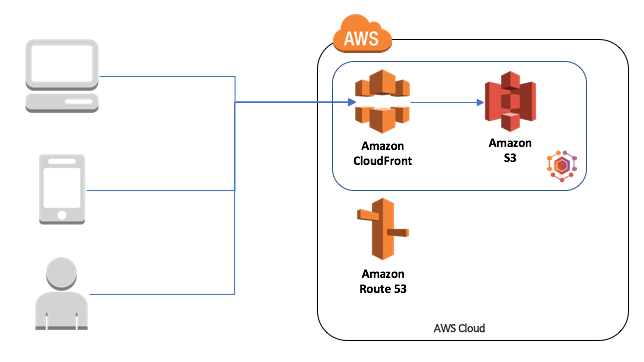
5. Build a Data Warehouse with Amazon Redshift
If you want to build a data warehouse, you can use Amazon Redshift. To do this, you can follow these steps:
- Create a Redshift cluster that stores your data.
- Load your data into your cluster using COPY or other methods.
- Create tables and views that organize and transform your data using SQL queries.
- Connect to your cluster using a SQL client or a BI tool.
- Monitor and optimize your cluster using Amazon Redshift console or Amazon CloudWatch.

These are just a few examples of practical AWS applications using different AWS services. With AWS, the possibilities are endless and you can build and deploy a wide range of applications and services to meet your specific needs.

Introduction: Social media marketing has become an integral part of digital marketing strategies for businesses worldwide. The ever-increasing reach of social media platforms and the ability to target specific audiences have made them an attractive marketing tool. However, social media marketing is not without its pitfalls. In this blog post, we will discuss five avoidable pitfalls of the social media marketing that businesses must be aware of to maximize their returns on investment (ROI).

Table of Contents:
- Focusing on the wrong metrics
- Not understanding your audience
- Ignoring negative feedback
- Lack of consistency in posting
- Not having a clear strategy
Focusing on the wrong metrics:
One of the common pitfalls of social media marketing is focusing on the wrong metrics. Businesses often make the mistake of focusing on vanity metrics such as the number of followers or likes, rather than meaningful metrics such as engagement rate and conversion rate. Having a large number of followers or likes does not necessarily translate into higher sales or ROI. Therefore, it is essential to focus on metrics that have a direct impact on the business's bottom line.
Not understanding your audience:
Another pitfall of social media marketing is not understanding your audience. Businesses must understand their target audience's preferences, interests, and behavior to create content that resonates with them. Failing to understand your audience can lead to ineffective marketing campaigns, resulting in lower engagement and conversion rates.
Ignoring negative feedback:
Ignoring negative feedback on social media can be detrimental to a business's reputation. Negative feedback provides an opportunity for businesses to address their customers' concerns and improve their products or services. Ignoring negative feedback can result in a damaged reputation and loss of customers.
Lack of consistency in posting:
Consistency is key when it comes to social media marketing. Posting regularly on social media platforms helps keep your brand in front of your audience, improves engagement, and helps build a loyal following. Failing to post regularly can result in a decrease in engagement and followers.
Not having a clear strategy:
Not having a clear strategy is a significant pitfall of social media marketing. A clear strategy helps businesses define their objectives, target audience, and metrics for success. Without a clear strategy, businesses risk wasting time and money on ineffective social media marketing campaigns.

Conclusion:
Social media marketing is a powerful tool for businesses to reach their target audience and improve their bottom line. However, it is essential to avoid the common pitfalls of social media marketing to maximize the returns on investment. By focusing on meaningful metrics, understanding your audience, addressing negative feedback, posting consistently, and having a clear strategy, businesses can create effective social media marketing campaigns that deliver results.

Holi is one of the most vibrant and joyful festivals in India. It is celebrated every year on the full moon day of the Hindu month of Phalguna, which usually falls in late February or early March. In 2023, Holi will be celebrated on March 8, with Chhoti Holi or Holika Dahan on March 7.
Holi is also known as the festival of colors, as people play with colored powders and water, splashing and spraying each other with fun and laughter. Holi is a celebration of life, love, and happiness. Time to forgive and forget, mend broken relationships, and express gratitude for all the blessings.
But do you know why Holi is celebrated? What are the stories and legends behind this colorful festival? What are the meanings and messages that Holi conveys? In this blog, we will explore the history and significance of Holi in India.
There are many stories and legends associated with Holi, but the most popular one is about Holika and Prahlad. Holika was a demoness who was the sister of King Hiranyakashipu, a tyrant who wanted everyone to worship him as God. Prahlad was his son who was a devotee of Lord Vishnu, the supreme deity in Hinduism. Hiranyakashipu hated his son’s devotion and tried to kill him many times, but failed. He then asked Holika to help him get rid of Prahlad. Holika had a boon that she could not be burned by fire, so she agreed to sit on a pyre with Prahlad on her lap. However, her boon was nullified by her evil intention, and she was burned to ashes while Prahlad emerged unharmed by chanting Lord Vishnu’s name. This story symbolizes the victory of good over evil and the power of faith.
Another story related to Holi is about Lord Krishna and Radha. Lord Krishna is an incarnation of Lord Vishnu who was born with a dark complexion due to a curse by a demon. He grew up in Vrindavan, where he fell in love with Radha, a fair-skinned girl. He was insecure about his appearance and wondered if Radha would love him back. His mother Yashoda advised him to apply some color to Radha’s face and make her look like him. He followed her advice and playfully smeared some color on Radha’s face, making her his own forever. Radha also reciprocated his love and accepted him as he was. This story symbolizes the divine love between Krishna and Radha and the celebration of diversity.
Holi is also marked as a harvest festival, commemorating spring’s arrival and the end of winter. It is a time when nature is filled with colors and beauty, inspiring people to rejoice in its glory. Holi also signifies new beginnings, as people shed their old clothes and wear new ones after playing with colors. It is an occasion when people let go of their grudges and negative energies, forgive their enemies, reconcile their differences, and start afresh with love and harmony.

For 10 seasons, from 1994 to 2004, the television landscape was forever changed by a show that depicted the trials, triumphs, and hilarious adventures of a tight-knit group of friends living in New York City. "Friends" became a cultural phenomenon, capturing the hearts of millions of viewers around the world. With its brilliant writing, talented ensemble cast, and relatable characters, it created unbreakable bonds both on-screen and off. In this blog post, we will dive deep into the enduring legacy of the legendary "Friends" series, exploring the reasons behind its massive success and the impact it has had on popular culture.

The Birth of a Sitcom Sensation :
"Friends" was the brainchild of David Crane and Marta Kauffman, who conceived a show centered around a group of young friends navigating the ups and downs of life in the bustling city of New York. The series premiered on September 22, 1994, and quickly captured the attention of audiences with its sharp writing, witty humor, and relatable storylines. From the iconic Central Perk coffee shop to the unforgettable theme song, the show had all the ingredients to become an instant hit.
Endearing Characters and Stellar Cast :
One of the primary reasons behind the series' success was its ensemble cast. Jennifer Aniston, Courtney Cox, Lisa Kudrow, Matt LeBlanc, Matthew Perry, and David Schwimmer portrayed the beloved characters of Rachel, Monica, Phoebe, Joey, Chandler, and Ross, respectively. Their remarkable chemistry and impeccable comedic timing brought the characters to life, making them feel like real friends to the viewers.
Each character had their unique quirks and personalities, allowing the audience to find someone to relate to. Whether it was Rachel's fashion sense, Monica's perfectionism, Phoebe's eccentricity, Joey's lovable charm, Chandler's sarcasm, or Ross's nerdy charm, there was a friend for everyone. These characters faced relatable challenges such as career struggles, relationship woes, and the complexities of adulting, which endeared them even more to the audience.
Memorable Moments and Enduring Catchphrases :
"Friends" delivered numerous unforgettable moments that have become embedded in pop culture history. From Ross's iconic "We were on a break!" to Joey's "How you doing'?" pick-up line, the series introduced a plethora of catchphrases that have since become ingrained in our everyday conversations. Whether it's "The Routine" dance, the Holiday Armadillo, or Joey's inability to share food, these moments continue to resonate with fans, even years after the show's finale.
Additionally, "Friends" showcased some of the most heartwarming and emotionally charged scenes. From Monica and Chandler's wedding to Ross's pivot disaster, the show masterfully balanced humor with touching moments that tugged at our heartstrings. It was this ability to elicit laughter and tears that made "Friends" such a beloved series.
Cultural Impact and Enduring Legacy :
The influence of "Friends" extends far beyond its initial run. It has had a profound impact on popular culture, inspiring countless other sitcoms and paving the way for ensemble casts. The show's success also propelled its cast members to new heights of stardom, with many of them becoming household names and enjoying successful careers beyond the series.
Even today, "Friends" continues to resonate with new generations through its availability on streaming platforms. The show's timeless themes of friendship, love, and the pursuit of happiness are universal and relatable, allowing it to maintain its relevance in an ever-changing television landscape.
Conclusion :
The legendary "Friends" series created unbreakable bonds not only between its characters but also with its audience. It remains an iconic sitcom that has stood the test of time, bringing laughter, joy, and a sense of familiarity to millions of viewers worldwide. The show's enduring legacy is a testament to its exceptional writing, stellar cast, and relatable storytelling. As we rewatch the episodes or introduce "Friends" to new fans, the series will continue to remind us of the importance of true friendship and the power of laughter.

Habits are an integral part of our lives, they shape our actions, thoughts, and ultimately our destiny. Habits are not formed overnight, they are a result of consistent actions that we perform repeatedly. The quality of our habits determines the quality of our lives. Good habits lead to success, happiness, and fulfillment, while bad habits lead to failure, misery, and regret. Therefore, it's essential to cultivate good habits that align with our goals, aspirations, and values.

James Clear's book "Atomic Habits" is a revolutionary guide that helps individuals create small habits that can lead to big changes in their lives. The book is based on the idea that small changes can create significant results if they are done consistently over time. The author presents a practical framework that can help anyone transform their habits and create a life of success, happiness, and fulfillment. In this blog, we will discuss some of the key concepts of the book and how they can be applied in real life.
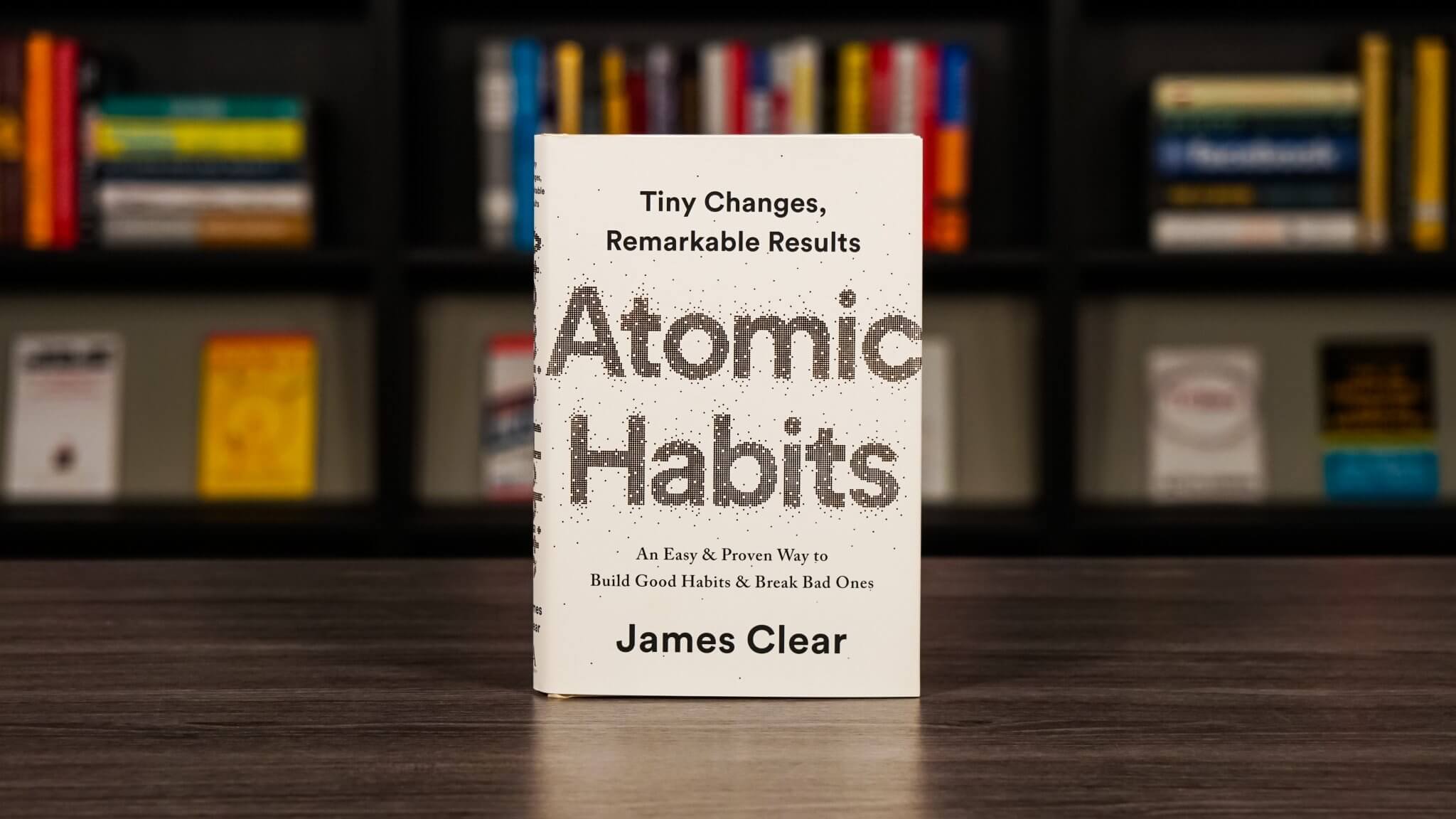
The Four Laws of Behavior Change
The author presents four laws of behavior change that can help individuals create good habits and break bad ones. The four laws are:
- Make it obvious
- Make it attractive
- Make it easy
- Make it satisfying
Making it obviously means that individuals should make their habits visible and clear. They should create a visual cue that reminds them of their habits. For example, if someone wants to drink more water, they can place a water bottle on their desk or carry it with them wherever they go. This will remind them to drink more water throughout the day.
Making it attractive means that individuals should make their habits appealing and rewarding. They should associate their habits with something positive that they enjoy. For example, if someone wants to exercise more, they can listen to their favorite music while working out or reward themselves with a healthy snack after the workout.
:max_bytes(150000):strip_icc()/3145195-article-tips-to-reduce-stress-5a8c75818e1b6e0036533c47-922c3155e9c846eaa7447c75030b2c13.png)
Making it easy means that individuals should make their habits simple and effortless. They should break down their habits into small and manageable tasks. For example, if someone wants to read more books, they can start by reading one page a day and gradually increase it over time.
Making it satisfying means that individuals should make their habits fulfilling and enjoyable. They should feel good after completing their habits. For example, if someone wants to meditate more, they can focus on the benefits of meditation such as reducing stress and increasing focus. This will make them feel satisfied and motivated to continue their habit.
The Four Laws of Behavior Change is a powerful framework that can help individuals create good habits and break bad ones. By following these laws, individuals can make their habits visible, appealing, simple, and fulfilling. This will make it easier for them to stick to their habits and create lasting changes in their lives.
The Power of Small Habits
The author emphasizes the power of small habits and how they can lead to significant changes in our lives. He argues that small habits are more sustainable than big ones because they are easier to maintain and require less willpower. Small habits can also create momentum that can lead to bigger changes over time. For example, if someone wants to lose weight, they can start by cutting out one unhealthy food item from their diet and gradually increase it over time. This will create a small habit that can lead to significant weight loss over time.

The author also emphasizes the importance of focusing on the process rather than the outcome. He argues that individuals should focus on the daily actions that lead to their desired outcomes rather than the outcomes themselves. By focusing on the process, individuals can enjoy the journey and create sustainable changes in their lives.
Conclusion
In conclusion, James Clear's book "Atomic Habits" is a powerful guide that can help individuals create small habits that lead to significant changes in their lives. The four laws of behavior change, the power of small habits, the 1% rule, and the importance of identity are some of the key concepts discussed in the book. By following these concepts, individuals can create sustainable habits that align with their goals, aspirations, and values. Habits are not formed overnight, they require consistent actions and effort over time. However, by focusing on small habits and making them a part of our identity, we can create lasting changes in our lives and achieve success, happiness, and fulfillment.

Introduction: Social media has become an essential tool for businesses to connect with their clients and reach out to potential customers. With millions of active users on different social media platforms, businesses can maximize their reach and engagement by utilizing effective social media strategies. In this blog post, we will discuss 5 social media strategies that can help businesses to maximize their clients and establish a strong online presence.

Table of Contents:
- Creating and Sharing Valuable Content
- Engaging with Your Followers
- Leveraging Influencers and Collaborations
- Using Paid Social Media Advertising
- Monitoring and Analyzing Your Performance

Creating and Sharing Valuable Content:
Content is the backbone of any social media strategy. It is important to create and share high-quality, valuable content that resonates with your target audience. You can use different types of content such as blogs, infographics, videos, and images to attract and engage your clients. Ensure that your content is informative, engaging, and visually appealing. Use relevant keywords in your content to improve your search engine rankings.
Engaging with Your Followers:
Engaging with your followers is a crucial aspect of any successful social media strategy. It is essential to respond to comments, messages and mentions promptly. Use social media platforms to ask for feedback, host polls, and encourage your clients to share their experiences. By engaging with your followers, you can build a strong relationship with them and improve your brand reputation.
Leveraging Influencers and Collaborations:
Influencer marketing has become a popular trend in social media marketing. Collaborating with influencers and industry leaders can help businesses to reach out to a wider audience and establish credibility. Identify relevant influencers in your niche and collaborate with them to promote your brand. You can also collaborate with other businesses to create mutually beneficial partnerships.
Using Paid Social Media Advertising:
Paid social media advertising can help businesses to reach out to a specific target audience and maximize their reach. Platforms such as Facebook, Instagram, and Twitter offer various advertising options such as sponsored posts, promoted tweets, and Instagram story ads. It is essential to identify your target audience and set clear goals before investing in paid social media advertising.
Monitoring and Analyzing Your Performance:
It is important to monitor and analyze your social media performance to determine the effectiveness of your strategy. Use social media analytics tools to track your engagement, reach, and conversions. Analyze your data to identify what works and what doesn't, and make adjustments to your strategy accordingly.

Conclusion:
Social media has become an essential tool for businesses to maximize their clients and establish a strong online presence. By creating and sharing valuable content, engaging with your followers, leveraging influencers and collaborations, using paid social media advertising, and monitoring and analyzing your performance, businesses can develop a successful social media strategy that maximizes their clients and drives results. Remember, social media is a constantly evolving landscape, and it is important to stay up-to-date with the latest trends and best practices to stay ahead of the competition.

Introduction: Building a successful ad company can be a daunting task, but it is possible if you follow certain tips and strategies. In this blog post, we will discuss 10 proven tips that can help you build a thriving ad company. These tips have been compiled from years of experience in the advertising industry and are designed to help you achieve your business goals.

Table of Contents:
- Define your brand
- Identify your target audience
- Develop a unique value proposition
- Create a strong online presence
- Build a diverse team
- Invest in technology
- Establish partnerships
- Offer exceptional customer service
- Measure and analyze results
- Continuously innovate

Tip 1: Define your brand
Your brand is the foundation of your ad company. It’s what sets you apart from your competitors and helps you connect with your audience. When defining your brand, it’s important to consider your mission statement, brand personality, and messaging. Your brand should be consistent across all platforms, including your website, social media, and advertising campaigns.
Tip 2: Identify your target audience
To build a successful ad company, you need to understand your target audience. This means identifying their needs, interests, and behaviors. Once you have a clear understanding of your audience, you can tailor your advertising campaigns to resonate with them.
Tip 3: Develop a unique value proposition
A unique value proposition (UVP) is what makes your ad company different from others. It’s the reason why clients should choose your company over your competitors. When developing your UVP, consider what sets you apart and how you can communicate that to potential clients.
Tip 4: Create a strong online presence
In today’s digital age, having a strong online presence is essential for any business. This includes a well-designed website, active social media accounts, and online advertising campaigns. Your online presence should be consistent with your brand and messaging.
Tip 5: Build a diverse team
A diverse team brings different perspectives and experiences to the table. This can lead to more creative and effective advertising campaigns. When building your team, consider diversity in terms of ethnicity, gender, age, and background.
Tip 6: Invest in technology
Technology can help streamline your advertising processes and improve the effectiveness of your campaigns. This includes advertising software, analytics tools, and communication platforms. Investing in the right technology can save you time and money in the long run.
Tip 7: Establish partnerships
Establishing partnerships with other businesses and organizations can help you expand your reach and increase your credibility. Consider partnering with complementary businesses, such as graphic design firms or web development companies.
Tip 8: Offer exceptional customer service
Exceptional customer service is essential for any business, but it’s especially important in the advertising industry. Clients need to feel that they are being heard and that their needs are being met. This can lead to repeat business and referrals.
Tip 9: Measure and analyze the results
Measuring and analyzing the results of your advertising campaigns is essential for continuous improvement. This includes tracking metrics such as website traffic, conversion rates, and social media engagement. Use this data to make informed decisions about future campaigns.
Tip 10: Continuously innovate
The advertising industry is constantly evolving, and it’s important to stay ahead of the curve. Continuously innovating means trying new strategies, exploring new platforms, and adapting to changes in the industry. This can help you stay relevant and competitive.
![]()
Conclusion:
Building a successful ad company takes time and effort, but following these 10 tips can help you achieve your business goals. By defining your brand, identifying your target audience, and developing a unique value proposition, you can differentiate yourself from your competitors. Creating a strong online presence, building a diverse team, and investing in technology can
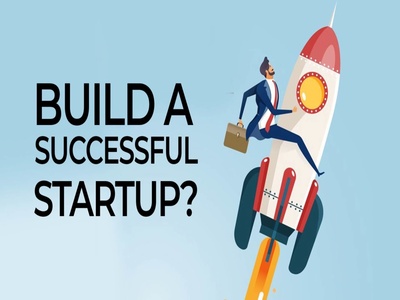
Maa Chandraghanta: The Warrior Goddess with a Crescent Moon on Her Forehead
In Hindu mythology, Maa Chandraghanta is one of the nine forms of Goddess Durga. She is worshiped on the third day of Navratri, a nine-day festival dedicated to the celebration of divine feminine energy. Her name, "Chandra, means moon, and "Ghanta" means bell. She is often depicted with a crescent moon on her forehead, which gives her the name Chandraghanta.

Maa Chandraghanta is portrayed as a warrior goddess riding a tiger with ten arms and three eyes. She carries a variety of weapons, including a trident, a sword, and a bow and arrow. Her third eye represents her ability to see beyond the material world, while her ten arms represent her immense power and strength.
The legend behind Maa Chandraghanta is that she appeared during a battle between the gods and demons, where her roar was so powerful that it caused a massive earthquake. The demons were so frightened by her presence that they immediately fled from the battlefield. Her appearance in battle represents the triumph of good over evil and the victory of light over darkness.

Maa Chandraghanta is also known for her protective powers, and devotees believe that worshiping her can bring them peace and prosperity. She is said to protect her followers from harm and grant them courage and strength in times of need.
To honor Maa Chandraghanta, devotees offer her flowers, incense, and prasad (food offerings). Some also fast on the third day of Navratri to show their devotion and respect. It is believed that by worshiping Maa Chandraghanta, one can receive her blessings and protection.
Maa Chandraghanta is worshipped on the third day of Navratri, and her blessings are believed to bring courage, strength, and victory in battles. She is also worshipped by those seeking protection from evil spirits and negative energy. Devotees offer milk, flowers, and sweets to the goddess, seeking her blessings and protection.
In addition to her fearsome appearance, Maa Chandraghanta is also believed to be an embodiment of compassion and love. She represents the power of a mother's love, which is fierce and protective yet nurturing and caring. She is a symbol of the divine feminine energy that resides in all of us, reminding us to embrace our strength and stand up for ourselves and those we love.
The tiger that Maa Chandraghanta rides on symbolizes power and strength. It is said that worshipping her can help one gain control over their fears and become more courageous in their actions.

The half-moon on her forehead represents the elimination of darkness and the emergence of light. It is believed that worshipping Maa Chandraghanta can help one gain clarity of thought and overcome confusion and doubts.
In addition to her role as a warrior goddess, Ma Chandraghanta is also considered to be a motherly figure who protects her devotees from harm. It is said that she blesses her devotees with good health, wealth, and prosperity.
Overall, Ma Chandraghanta is a powerful and revered goddess in Hindu mythology. Her worship during Navratri is considered to be of great importance, and her blessings are believed to bring success, strength, and protection to her devotees.
In conclusion, Maa Chandraghanta is a powerful and fierce warrior goddess who embodies courage, strength, and protection. She is worshipped during Navratri for her blessings and is a reminder to all of us to embrace our inner strength and stand up for what is right. The bell on her forehead is a symbol of peace and serenity, reminding us that even in the midst of chaos and battle, we can find inner calm and stillness. Let us all seek the blessings of Maa Chandraghanta and embody her fierce yet compassionate energy in our daily lives.

Cracking the Union Public Service Commission (UPSC) examination is a dream for many aspiring civil servants in India. Considered one of the toughest exams in the country, the UPSC examination demands a comprehensive understanding of various subjects, analytical skills, and effective time management. While it may seem like a daunting task, with the right approach and a well-structured strategy, cracking the UPSC can become an achievable goal. In this blog, we will explore some practical tips and strategies that can make your journey toward success in the UPSC examination easier and more rewarding.
Understand the Exam
Before diving into preparation, it is crucial to have a clear understanding of the UPSC examination. Familiarize yourself with the exam pattern, syllabus, and marking scheme. The three stages of the UPSC exam—preliminary, mains, and interview—each require different skills and preparation strategies. Analyze previous years' question papers to identify trends, prioritize topics, and gain insights into the examiner's expectations.
Create a Study Plan
Developing a well-structured study plan is essential for effective UPSC preparation. Break down the syllabus into manageable chunks and allocate specific time slots for each subject. Balance your study hours with regular breaks to avoid burnout. Focus on both static and current affairs topics, as UPSC gives significant importance to the latter. Set achievable targets, track your progress, and make necessary adjustments to your plan along the way.
Choose the Right Study Material
Selecting the appropriate study material is crucial for UPSC preparation. Rely on standard textbooks, recommended by experts and previous successful candidates. Make use of online resources, such as UPSC-specific websites, educational platforms, and government publications. Curate a collection of reliable sources for current affairs, including newspapers, magazines, and online portals. Regularly revise and consolidate your knowledge by making concise notes.
Focus on Conceptual Understanding
The UPSC examination assesses candidates' understanding and application of concepts rather than rote memorization. Emphasize conceptual clarity by studying each topic in-depth. Develop a habit of critically analyzing information, connecting concepts across subjects, and applying them to real-life scenarios. Develop your own perspectives on relevant issues, supported by evidence and logical reasoning.
Practice Answer Writing
Effective answer writing is crucial for scoring well in the UPSC mains examination. Practice writing answers within the word limit, adhering to the prescribed structure and format. Regularly solve previous years' question papers and simulate exam-like conditions to improve time management and enhance writing skills. Seek feedback from mentors, join answer-writing sessions, and participate in mock tests to refine your approach.
Stay Updated with Current Affairs
Current affairs play a significant role in the UPSC examination. Stay updated with national and international news, government policies, social issues, and economic developments. Follow reputed news sources, attend seminars, and engage in discussions to gain multiple perspectives. Maintain a comprehensive compilation of current affairs notes, making it easier to revise closer to the examination.
Test Yourself Regularly
your progress and identify areas that require further improvement. Take regular mock tests and solve previous years' question papers to get acquainted with the exam pattern, manage time effectively, and identify your strengths and weaknesses. Analyze your performance, learn from mistakes, and adapt your preparation strategy accordingly.
Conclusion
Cracking the UPSC examination requires dedication, perseverance, and strategic planning. By understanding the exam pattern, creating a comprehensive study plan, focusing on conceptual understanding, practicing answer writing, staying updated with current affairs, and testing yourself regularly, you can enhance your chances of success. Remember, there are no shortcuts, but with consistent effort and the right approach, you can unlock the doors to a rewarding career in civil services.

After a long delay, the teaser for the largely awaited film" Pushpa 2" starring Allu Arjun and Rashmika Mandanna has eventually been released. The teaser reveals the tagline" Phool Nahi, Aag Hai"( Not a flower, but fire) and introduces Allu Arjun's character as Pushpa Raj. The makers of the film released the teaser as a birthday gift for Allu Arjun, who turned 41 on April 8, 2023.
The teaser shows Pushpa as a man of the people and features a manhunt for him, shot by Bhanwar Singh Shekhawat played by Fahad Faasil. It begins with news channels broadcasting Pushpa's supposed death and people protesting against the police. still, in the end, it's revealed that Pushpa is alive. The teaser ends with an iconic scene of Pushpa being captured by a night vision camera as a barracuda takes two way back to see him. Pushpa does his hand gesture and declares," Pushpa is then to rule."
Pushpa Trailer Out Now
Watch the special teaser of Pushpa 2 The Rule for Allu Arjun's birthday then
also, the makers of the film also released a bill featuring Rashmika Mandanna as Srivalli, Pushpa Raj's woman . The alternate investiture of the film will explore Pushpa's nonage and his connections with his father and half- siblings. The clash between Pushpa and Bhanwar Singh will continue in this grand conclusion to the two- part series. The film's music is composed by Sevi Sri Prasad and produced by Mythri Movie Makers.
About Pushpa 2 The Rule
the teaser of" Pushpa 2 The Rule" features an instigative and violent regard into the forthcoming movie. The teaser shows the manhunt for Pushpa Raj, played by Allu Arjun, who appears as a man of the public and tries to break the riddle girding his whereabouts. The teaser promises an grand conclusion to the two- part series and explores Pushpa Raj's nonage and connections with his father and half- siblings.
The teaser ends with an iconic scene where Pushpa Raj is seen alive and captures the attention of a barracuda in the night vision camera. He does his notorious' Thaggede Le' sign and declares that" Pushpa is then to rule". The teaser also includes a special bill of Rashmika Mandanna as Srivalli, who returns as Pushpa Raj's woman in the alternate investiture.
The release date for" Pushpa 2 The Rule" has not been verified, but it's anticipated to be released in 2023 or 2024. The movie is directed by Sukumar and subsidized by Mythri Movie Makers, with music composed by Sevi Sri Prasad.
Pushpa 2 release date
Directed by Sukumar, the release date of" Pushpa 2" has been laid over to March- April 2024 due to the director's perfectionist approach. suckers eagerly await the release of the film to witness the grand conclusion to Pushpa Raj's story.

Starting and running a business successfully is not an easy task. It requires hard work, dedication, and smart strategies. Whether you're a small business owner or an entrepreneur looking to grow your business, there are certain key tips that can help you maximize your success. In this blog, we will discuss some of the essential business tips that can help you achieve your goals and grow your business.

Tip 1: Know Your Target Market
The first and foremost step to running a successful business is understanding your target market. You need to know who your ideal customers are, what they need, and what they're willing to pay for. Conducting market research is crucial for identifying your target audience and tailoring your products or services to meet their needs. Once you know your target market, you can create effective marketing strategies that resonate with your customers and generate more sales.
Tip 2: Create a Strong Online Presence
In today's digital age, having a strong online presence is essential for any business. Your website is often the first impression customers have of your business, so it's important to create a professional and user-friendly website. You should also create social media accounts and actively engage with your customers through social media platforms. By building a strong online presence, you can reach a wider audience and establish your brand as a trustworthy and reliable source of products or services.
Tip 3: Build Strong Relationships with Customers
Building strong relationships with your customers is key to long-term success. You should aim to provide excellent customer service, respond promptly to customer inquiries, and show appreciation for their business. Building a loyal customer base can help you generate repeat business, positive reviews, and word-of-mouth referrals.
Tip 4: Focus on Innovation and Adaptation
In today's fast-paced business environment, it's important to be innovative and adaptable. You should constantly be looking for ways to improve your products or services and stay ahead of your competitors. You should also be prepared to adapt to changes in the market, such as new technologies or shifts in consumer behavior. By focusing on innovation and adaptation, you can ensure that your business stays relevant and continues to grow.
Tip 5: Stay Organized and Manage Your Finances
Running a successful business requires effective organization and financial management. You should keep accurate records of your expenses and revenue, and regularly review your financial statements to identify areas for improvement. It's also important to set realistic financial goals and develop a budget to help you stay on track.

Conclusion:
Maximizing your success in business requires a combination of hard work, dedication, and smart strategies. By following these essential business tips, you can increase your chances of success and achieve your goals. Remember to stay focused on your target market, create a strong online presence, build strong relationships with customers, focus on innovation and adaptation, stay organized, and manage your finances effectively. With these tips in mind, you can take your business to the next level and achieve the success you've always dreamed of.

Entrepreneurship is not just a fancy term; it is a path that leads to success and financial freedom. Entrepreneurship is all about pursuing your passion and converting your ideas into a successful business venture. In this guide, we will explore the journey of entrepreneurship, starting from the inception of an idea to the point where it becomes a successful business.

Table of Contents
I. Generating Business Ideas
II. Conducting Market Research
III. Building a Business Plan
IV. Raising Capital
V. Creating a Brand Identity
VI. Launching Your Business
VII. Managing and Growing Your Business
VIII. Conclusion

I. Generating Business Ideas
The first step towards entrepreneurship is to generate a business idea. It could be something that you are passionate about, or it could be a gap that you have identified in the market. Some of the ways to generate business ideas are:
• Identify problems in your everyday life and try to come up with solutions.
• Identify gaps in the market and try to create a product or service to fill that gap.
• Identify emerging trends in the market and try to capitalize on them.
II. Conducting Market Research
Once you have a business idea, the next step is to conduct market research. It involves analyzing the target market, competition, and potential customers. Market research helps you to understand the market demand and whether your business idea is feasible or not. Some of the ways to conduct market research are:
• Analyze the market demand for your product or service.
• Analyze the competition and understand their strengths and weaknesses.
• Identify potential customers and understand their preferences.
III. Building a Business Plan
A business plan is a document that outlines the goals, strategies, and financial projections of your business. It helps you to visualize the future of your business and identify potential challenges. A well-written business plan can also help you to raise capital. Some of the things to include in a business plan are:
• Executive Summary
• Market Analysis
• Product/Service Description
• Marketing and Sales Strategies
• Financial Projections
IV. Raising Capital
Raising capital is one of the biggest challenges that entrepreneurs face. There are several ways to raise capital, such as:
• Bootstrapping
• Angel Investors
• Venture Capitalists
• Crowdfunding
• Bank Loans
V. Creating a Brand Identity
Creating a brand identity is essential for any business. It helps you to establish a unique identity in the market and create a strong brand image. Some of the things to consider while creating a brand identity are:
• Logo Design
• Brand Colors
• Brand Messaging
• Brand Personality
VI. Launching Your Business
Launching your business is a critical step in the journey of entrepreneurship. It involves bringing your product or service to the market and establishing a customer base. Some of the things to consider while launching your business are:
• Product Launch Strategy
• Marketing and Advertising
• Sales Strategy
• Customer Acquisition
VII. Managing and Growing Your Business
Once you have launched your business, the next step is to manage and grow it. It involves managing finances, employees, and customers. Some of the things to consider while managing and growing your business are:
• Financial Management
• Employee Management
• Customer Relationship Management
• Business Expansion

VIII. Conclusion
Entrepreneurship is a journey that requires hard work, dedication, and persistence. It is not an easy path, but it is a path that leads to success and financial freedom. In this guide, we have explored the journey of entrepreneurship, starting from the inception of an idea to the point where it becomes a successful business. By following these steps, you can convert your ideas into a successful business venture.

Are you ready to take your freelance career to the next level? Freelancing offers incredible flexibility and opportunities, but mastering it requires a combination of skills, strategies, and mindset. In this blog post, we'll explore some key strategies for success in the world of freelancing.
Define Your Niche
One of the first steps to mastering freelance is defining your niche. What are your core skills and expertise? Identify the areas where you excel and have a passion. Specializing in a particular niche not only sets you apart from the competition but also allows you to charge higher rates for your specialized knowledge.
Build an Impressive Portfolio
Your portfolio is your freelance calling card. Showcase your best work and highlight your achievements. Potential clients often make decisions based on the quality of your previous projects, so invest time in curating an impressive portfolio that reflects your skills and versatility.
Cultivate Strong Client Relationships
Freelancers rely on repeat business and referrals, so building strong client relationships is crucial. Communicate effectively, meet deadlines, and exceed client expectations. A satisfied client is more likely to hire you again and recommend your services to others.
Manage Your Time Wisely
Effective time management is essential for freelancers. Create a schedule, set deadlines, and stick to them. Use productivity tools and techniques to stay organized and focused on your work. Remember, time is money in the freelance world.
Price Your Services Strategically
Determining your pricing strategy can be challenging, but it's crucial for success. Research market rates for your niche and consider your experience and expertise when setting your prices. Don't undervalue your work; charge what you're worth.
Continuously Upskill
The freelance landscape is ever-evolving, so staying updated with industry trends and technologies is essential. Invest in your education and skill development. This not only keeps you competitive but also opens up new opportunities.
Network and Market Yourself
Networking is a powerful tool for freelancers. Attend industry events, join online forums, and connect with fellow freelancers and potential clients. Effective self-promotion and marketing can help you grow your freelance business.
Plan for Financial Stability
Freelancing often comes with income fluctuations. Plan for financial stability by setting aside a portion of your earnings for savings and emergencies. Consider establishing a retirement plan and seeking financial advice if necessary.
Embrace a Growth Mindset
Success in freelancing requires a growth mindset. Be open to feedback, learn from failures, and adapt to changing circumstances. Continuous improvement is the key to long-term success.
Maintain a Work-Life Balance
Lastly, remember to maintain a healthy work-life balance. Freelancing offers flexibility, but it's essential to set boundaries to prevent burnout. Take breaks, spend time with loved ones, and prioritize your well-being.
Set Clear Goals
Outline your short-term and long-term goals as a freelancer. Having a clear direction will help you stay motivated and focused. Regularly revisit and adjust your goals as your freelance career progresses.
Create a Professional Online Presence
Build a professional website and establish a strong online presence through social media platforms like LinkedIn, Twitter, or Instagram. Your online presence is often the first impression potential clients have of you.
Invest in Tools and Technology
Consider investing in tools and software that can streamline your freelance work, whether it's project management software, accounting tools, or design software. The right tools can increase efficiency and productivity.
Understand Your Market
Stay informed about your target market's needs and preferences. Conduct market research to identify emerging trends and adapt your services accordingly.
Develop a Solid Contract and Payment Process
Protect yourself and your clients by using clear, comprehensive contracts that outline project scope, payment terms, and deadlines. Having a reliable payment process in place ensures you get paid promptly for your work.
Seek Feedback and Reviews
Encourage clients to provide feedback and reviews after completing projects. Positive reviews can enhance your reputation and credibility, making it easier to attract new clients.
Diversify Your Income Streams
Explore different sources of income within your niche. This could include offering additional services, creating digital products, or even teaching your skills through online courses.
Join Freelance Communities
Joining freelance communities and associations can provide you with valuable insights, support, and networking opportunities. It's a great way to connect with like-minded professionals.
Manage Taxes and Finances
Freelancers often have to handle their taxes. Consider consulting with an accountant or tax professional to ensure you're meeting all tax obligations and optimizing your financial situation.
Practice Self-Care
Don't forget to take care of yourself physically and mentally. Freelancing can be demanding, so make time for relaxation, exercise, and stress management to maintain your well-being.
Stay Updated on Legal Matters
Stay informed about legal aspects of freelancing, such as contracts, intellectual property, and liability issues. Consulting with a legal expert can help you navigate these areas effectively.
Monitor Your Success Metrics
Keep track of key performance indicators (KPIs) for your freelance business. This data can help you identify areas for improvement and measure your progress toward your goals.
Be Adaptable
The freelance industry can be unpredictable. Be prepared to pivot when necessary, whether it's taking on new types of projects or adjusting your marketing strategy.
Celebrate Your Achievements
Recognize and celebrate your milestones and achievements. This positive reinforcement can keep you motivated and remind you of how far you've come.
Pay It Forward
As you gain experience and expertise, consider mentoring or helping newer freelancers. Sharing your knowledge can benefit both you and the freelancing community as a whole.
Remember, mastering freelance is a continuous journey. By applying these strategies, staying motivated, and remaining adaptable, you can build a successful and fulfilling freelance career. Good luck!
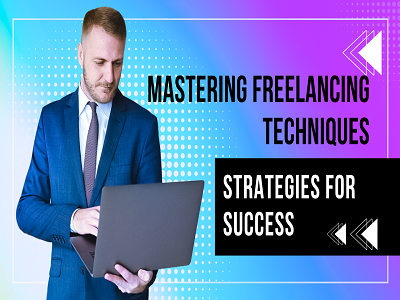
The key to a successful fitness journey lies in a combination of both exercise and nutrition. While it's important to put in the effort at the gym, it's equally important to fuel your body with the right nutrients to support your fitness goals. In this blog post, we will be discussing a 7-day gym diet plan that will help you stay on track with your fitness goals.

Day 1:
On the first day of your gym diet plan, it's important to start your day with a healthy breakfast that will provide you with the energy you need for your workout. A good option is an oatmeal with some fresh fruit and a scoop of protein powder. For lunch, try a salad with some grilled chicken or fish and some healthy fats like avocado or nuts. For dinner, aim for a protein-rich meal like grilled chicken or salmon with some steamed vegetables.
Day 2:
For day 2 of your gym diet plan, start your day with a protein-packed breakfast like scrambled eggs with spinach and some whole-grain toast. For lunch, opt for a turkey or chicken sandwich on whole-grain bread with some veggies on the side. For dinner, try a stir-fry with some lean protein like shrimp or tofu, lots of veggies, and some brown rice.
Day 3:
On day 3, start your day with a protein shake made with protein powder, almond milk, and some frozen berries. For lunch, try a wrap with some grilled chicken or turkey, lots of veggies, and some hummus for added flavor. For dinner, aim for a protein-rich meal like grilled steak or pork chops with some roasted sweet potatoes and steamed veggies.
Day 4:
For day 4, start your day with some Greek yogurt topped with some fresh fruit and granola. For lunch, try a veggie burger on a whole-grain bun with some sweet potato fries on the side. For dinner, opt for a healthy pasta dish like whole-grain pasta with some grilled chicken, lots of veggies, and a tomato-based sauce.
Day 5:
On day 5, start your day with a breakfast burrito made with scrambled eggs, black beans, veggies, and some whole-grain tortillas. For lunch, try a spinach and quinoa salad with some grilled chicken or tofu and some nuts for added crunch. For dinner, try a grilled fish like salmon with some roasted veggies and quinoa on the side.
Day 6:
For day 6, start your day with a smoothie made with protein powder, almond milk, and some frozen fruit. For lunch, try a chicken or turkey wrap with some veggies and avocado on a whole-grain wrap. For dinner, try a lean protein like grilled chicken or fish with some roasted veggies and brown rice.
Day 7:
On the final day of your gym diet plan, start your day with a protein-packed breakfast like a spinach and feta omelet with some whole-grain toast on the side. For lunch, try a tuna salad on a bed of greens with some whole-grain crackers on the side. For dinner, aim for a lean protein like grilled shrimp or chicken with some roasted veggies and sweet potato on the side.

Conclusion:
By following this 7-day gym diet plan, you will be able to fuel your body with the right nutrients to support your fitness goals. Remember to also stay hydrated by drinking plenty of water throughout the day and snacking on healthy options like fruits, nuts, and veggies. With a combination of exercise and nutrition, you will be well on your way to achieving your fitness goals.

India opened its medal account at the Commonwealth Games 2022 on Saturday with 21-year-old weightlifter Sanket Mahadev Sargar claiming a silver in the men's 55 kg category. He wanted nothing less than the gold, but two failed clean and jerk attempts spoiled his chances, and settled for a combined lift of 248 kg (113 kg+135 kg) to finish second.
Then fellow lifter Gururaja Poojary, the silver medallist in the last edition (56 kg), took the bronze in men's 61 kg. But the biggest attraction of the day was Saikhom Mirabai Chanu, who shattered Commonwealth Games records to win India's first gold medal. Later, another Tokyo Olympic Games medallist Lovlina Borgohain (boxing) started her campaign with a 5-0 win. Bindyarani Sorokhaibam, then, won India's fourth medal of the day in the women's 55 kg weightlifting. The women's hockey team also won but the women's table tennis team, the defending champions, crashed out. Catch Day 2 highlights.

Mother Shailputri, also known as Goddess Shailputri, is the first among the nine forms of Goddess Durga. She is worshiped on the first day of the Navratri festival, which is celebrated all across India with great enthusiasm and devotion. The word ‘Shailputri’ is derived from two words, ‘Shail’ meaning mountain, and ‘Putri’ meaning daughter. Thus, she is known as the daughter of the mountains.
According to Hindu mythology, Mother Shailputri is believed to be the reincarnation of Sati, the first wife of Lord Shiva. Sati had immolated herself in the holy fire as she could not bear the humiliation meted out to her husband by her own father, King Daksha. After Sati's death, Lord Shiva became detached from the world, and his anger manifested in the form of Veerabhadra, who destroyed King Daksha's yajna.
To pacify Lord Shiva, the Gods created a new body for Sati, which was found in the Himalayan mountains. This new form was named Shailputri, and she married Lord Shiva. She is depicted as a beautiful woman riding on a bull, with a trident in her right hand and a lotus flower in her left hand. The bull is believed to be her vehicle, which represents dharma, strength, and stability.

Mother Shailputri is also associated with the Muladhara chakra, which is located at the base of the spine. This chakra is associated with the element of earth, and it represents stability, grounding, and the physical body. It is believed that by worshiping Mother Shailputri, one can activate and balance the Muladhara chakra, which can bring stability and balance to one's life.
During Navratri, devotees worship Mother Shailputri with great devotion and offer her flowers, fruits, and sweets. They also perform various rituals, such as fasting and reciting mantras, to seek her blessings. It is believed that by worshiping her, one can overcome all obstacles and attain success in life.
Her worship during Navratri is believed to bring peace, prosperity, and happiness to the devotees. On the first day of Navratri, devotees offer special prayers and perform puja to seek the blessings of Maa Shailputri. It is also believed that worshipping Maa Shailputri can help in overcoming physical and mental ailments, and provide strength and courage to face life's challenges.

Apart from Navratri, Maa Shailputri is also worshipped on various occasions, such as weddings, childbirth, and housewarming ceremonies. She is considered to be the nurturer of the universe and the provider of abundance and blessings.
In conclusion, Maa Shailputri is an embodiment of strength, beauty, and divine power. Her worship helps us connect with nature and seek the blessings of the divine feminine. Her grace can help us overcome obstacles and lead a life filled with peace and prosperity.

The lifestyle of a webdeveloper consumes a lot of efforts on web searching for an accurate solution to client's demand.
Well, again your buddy of all time-RedCat IT Solutions is here to the rescue.
We will today provide you the secret ...um no... TOP secret website list every web developer must know. These are like the icing on the cake you are an experienced web developer and also a perfect guide if you have just started your career/ learning in web development.
Starting off the list, the most popular and almost every developer's savior comes :
- StackOverFlow
If you are into coding every once in a while your must have searched for a solution to your problem on this website.
StackOverFlow is the one-stop solution to all your queries regarding coding problems and their top most voted answers.
It is a community, Developed by Developers for the Developers since
Just Kidding.. Or AM I?
StackOverFlow : https://stackoverflow.com/ - OverAPI
OverAPI is a single destination for the documentation for almost all the programming languages out in the world
This holds the second position on our list.
OverAPI : https://overapi.com/ - Snappify
Snappify is an absolute game changer in the coding universe, with this website you can create your code snippets and test it in the live environment.
Snappify : https://snappify.io/ - LeetCode
You must have heard about this website in your engineering college days, this used to be the Atlas for Programming Interviews.
You can give a mock test for DSA (Data Structures and Algorithms) related problems at one stop and check your level of preparation.
LeetCode : https://leetcode.com/ - Learn Anything
As the name suggests, this website is a guide to all the programming languages you want to learn just plan your learning with tutorials, code snippets, and Github repositories.
LearnAnything : https://learn-anything.xyz/
We hope that this helps you discover your way to the Magical world of Narnia... umm no that's not gonna happen.
But these will surely help you get good salary hikes and your Dream Job.
That's it for now.
See you around. Keep Hustling, Keep Coding.

Introduction
Artificial Intelligence (AI) has emerged as the latest trending topic, captivating minds and industries across the globe. With its potential to revolutionize various sectors, AI has become an essential aspect of modern life. This blog delves into the current state of AI, its recent advancements, and its promising future.
1. AI in Healthcare: Saving Lives with Precision
AI is reshaping the healthcare landscape by providing accurate diagnoses and personalized treatment plans. Machine learning algorithms can analyze vast amounts of medical data and identify patterns that might escape the human eye. From early detection of diseases to drug discovery and robotics-assisted surgeries, AI's influence on healthcare is substantial.
2. AI-Powered Automation: Enhancing Efficiency and Productivity
Businesses are rapidly adopting AI-powered automation to streamline processes and boost productivity. Robotic Process Automation (RPA) and AI chatbots have become increasingly popular, minimizing repetitive tasks and improving customer service. The integration of AI in supply chain management and predictive maintenance has also resulted in significant cost reductions and increased operational efficiency.
3. Natural Language Processing (NLP): Redefining Human-Computer Interaction
The advancements in NLP have brought about a more intuitive human-computer interaction. AI-driven virtual assistants like Siri and Alexa have become an integral part of our daily lives, simplifying tasks and providing valuable information. Sentiment analysis and language translation are also becoming more accurate, facilitating global communication and sentiment tracking.
4. AI in Finance: Transforming the Industry Landscape
Financial institutions are leveraging AI to enhance fraud detection, risk assessment, and customer service. AI-powered algorithms analyze market trends, enabling smarter investment decisions and portfolio management. Additionally, robo-advisors have gained popularity, providing personalized financial advice to individual investors.
5. Autonomous Vehicles: Paving the Way for Safer Transportation
The automotive industry is witnessing a significant shift with the development of autonomous vehicles. AI technology has enabled vehicles to perceive their surroundings and make real-time decisions, reducing the likelihood of accidents caused by human error. As autonomous vehicles become more prevalent, they hold the promise of revolutionizing transportation systems and reducing traffic congestion.
6. AI Ethics and Responsible AI
With the increasing integration of AI in various domains, the ethical implications of its applications have gained attention. Issues surrounding data privacy, bias in AI algorithms, and AI-driven job displacement are some of the key concerns that need to be addressed. The development of responsible AI frameworks is crucial to ensure the technology's beneficial and equitable use.
Conclusion
Artificial Intelligence has transcended from science fiction to reality, transforming industries and enhancing human lives in profound ways. The latest advancements in AI have opened up new avenues for growth and innovation, promising a future that was once unimaginable. As AI continues to evolve, it is essential to strike a balance between technological advancements and ethical considerations to harness its full potential for the betterment of society. Embracing AI with responsibility and foresight will shape a future where man and machine coexist harmoniously, ushering in a new era of progress and prosperity.


Chaitra Navratri is a Hindu festival that is celebrated for nine days during the Hindu month of Chaitra, which usually falls in March or April. This festival is celebrated with great enthusiasm and devotion by Hindus all over the world, and it marks the beginning of the Hindu New Year.
Navratri means 'nine nights' in Sanskrit, and during this festival, devotees worship the nine forms of the goddess Durga, also known as Navadurga. The nine forms of Durga are Shailaputri, Brahmacharini, Chandraghanta, Kushmanda, Skandamata, Katyayani, Kalaratri, Mahagauri, and Siddhidatri. Each form of Durga represents a particular attribute or quality and is worshipped accordingly.

The first day of Navratri is known as Ghatasthapana, which marks the beginning of the nine-day festival. On this day, a pot filled with water is placed in the puja room and decorated with mango leaves and a coconut. This post is considered to be a symbol of the goddess Durga, and it is worshiped throughout the nine days of the festival.

The first three days of Chaitra Navratri are dedicated to Goddess Durga, who is worshipped as the embodiment of power and energy. The next three days are dedicated to Goddess Lakshmi, the goddess of wealth and prosperity. The last three days are dedicated to Goddess Saraswati, the Goddess of knowledge and wisdom.
During Navratri, devotees observe fasts, perform pujas, and offer prayers to the goddess Durga. Many people also choose to refrain from consuming alcohol and non-vegetarian food during this period. It is believed that by observing these rituals, devotees can attain spiritual purification and can receive blessings from the goddess.
Apart from its religious significance, Chaitra Navratri also holds cultural and social importance. People decorate their houses with flowers and lights, and women wear new clothes and jewelry. Many communities organize Garba and Dandiya Raas dances during Navratri, where people dance to the beat of traditional music and celebrate the festival with great zeal and enthusiasm.
On the eighth day of Navratri, which is known as Ashtami, young girls are worshiped as embodiments of the goddess Durga. This day is also known as "Kanya Pujan," and it is believed that by worshiping young girls, one can receive the blessings of the goddess Durga.
On the ninth day of Chaitra Navratri, devotees worship the ninth form of Goddess Durga, known as Siddhidatri. The word "Siddhi" means "perfection" or "success," and "Datri" means "the giver." Goddess Siddhidatri is believed to be the ultimate giver of boons and blessings. She is also known as Adi Shakti, the original power or energy that created the universe.
The ninth and final day of Navratri is known as Navami, and it is considered to be the most important day of the festival. On this day, devotees offer prayers to the goddess Durga and seek her blessings. The festival culminates with the immersion of the pot, which is a symbol of the goddess Durga.
In conclusion, Chaitra Navratri is a festival that is celebrated with great devotion and enthusiasm by Hindus all over the world. It is a time to seek the blessings of the goddess Durga and to attain spiritual purification through fasting, prayer, and other rituals. This festival is a reminder of the power of the goddess, and of the importance of devotion and faith in our lives.

Bodybuilding is an intensive sport that requires dedication, hard work, and proper nutrition. Without proper nutrition, you cannot expect to achieve your bodybuilding goals. A proper bodybuilding nutrition plan is crucial to fuel your body with the right nutrients for the growth, repair, and maintenance of muscle tissue. In this blog post, we will provide you with a beginner's guide to an effective bodybuilding nutrition plan.

1. Set Your Goals
Before you start a bodybuilding nutrition plan, you need to set your goals. Do you want to gain muscle mass or lose body fat? Your goals will determine your nutrition plan, so it's important to be clear about what you want to achieve.
2. Calculate Your Calorie Needs
The next step is to calculate your calorie needs. This will give you an idea of how many calories you need to consume to maintain your current weight or gain muscle mass. There are several online calculators that can help you with this, but you can also consult with a nutritionist for a more accurate calculation.
3. Determine Your Macronutrient Ratio
Once you know your calorie needs, the next step is to determine your macronutrient ratio. Macronutrients are the nutrients that provide calories, including protein, carbohydrates, and fats. Each macronutrient plays a unique role in your body, so it's important to balance them properly.
Protein is essential for muscle growth and repair, so bodybuilders should aim to consume at least 1 gram of protein per pound of body weight. Carbohydrates provide energy for your workouts, and fats are essential for hormone production and overall health. A balanced macronutrient ratio for bodybuilders is typically 40% protein, 40% carbohydrates, and 20% fats.
4. Choose the Right Foods
Choosing the right foods is crucial for an effective bodybuilding nutrition plan. Focus on whole, nutrient-dense foods that provide the right balance of macronutrients. Some examples of good protein sources include chicken, fish, lean beef, and plant-based sources like tofu and lentils.
Good carbohydrate sources include whole grains, fruits, and vegetables. Healthy fats can be found in nuts, seeds, avocados, and olive oil. It's important to avoid processed foods, sugary drinks, and foods high in saturated and trans fats.
5. Plan Your Meals
Planning your meals is essential to ensure that you are getting the right balance of macronutrients throughout the day. You can use meal planning apps or websites to create a meal plan that fits your calorie and macronutrient needs.
It's important to eat every 3-4 hours to keep your metabolism running and provide your muscles with a steady stream of nutrients. Make sure to include protein, carbohydrates, and healthy fats in every meal.
6. Stay Hydrated
Staying hydrated is important for overall health and muscle function. Drink at least 8-10 glasses of water per day, and more if you are exercising intensively. You can also include sports drinks or electrolyte supplements during your workouts to replace lost fluids and minerals.
7. Supplement Wisely
Supplements can be a helpful addition to your bodybuilding nutrition plan, but they are not essential. Protein supplements like whey protein can be helpful for meeting your daily protein needs, especially if you have trouble getting enough protein from whole foods.
Other supplements like creatine, beta-alanine, and caffeine can also be helpful for improving performance and muscle growth. However, it's important to research supplements carefully and consults with a healthcare professional before taking them.

Conclusion:
An effective bodybuilding nutrition plan is essential for achieving your fitness goals. By setting your goals, calculating your calorie needs, determining your macronutrient ratio, choosing the right foods, planning your meals, staying hydrated, and supplementing wisely, you can provide your body with the right nutrients to fuel your workouts, build muscle mass, and improve your overall health.

Sir Ratan Tata, the legendary Indian businessman, philanthropist, and former chairman of Tata Sons, has been honored with the highest civilian award in Australia - the Knight Grand Cross of the Order of Australia. This is the latest in a long list of accolades received by the iconic industrialist, who is widely regarded as one of the most influential business leaders in India and around the world. In this blog post, we will discuss the details of the honor and the contributions that Sir Ratan Tata has made to the business world and beyond.
Who is Sir Ratan Tata?
Sir Ratan Tata is one of the most respected business leaders in India and around the world. He is the former chairman of Tata Sons, the holding company of the Tata Group, which is one of the largest conglomerates in India. Sir Ratan Tata was born in 1937 into the Tata family, which has been instrumental in shaping the Indian economy for over a century. He took over the reins of Tata Sons in 1991 and served as the chairman until his retirement in 2012.

What is the Knight Grand Cross of the Order of Australia?
The Knight Grand Cross of the Order of Australia is the highest civilian honor in Australia. It is awarded to individuals who have made significant contributions to their respective fields, or to society as a whole. The award was created in 1975 by Queen Elizabeth II, and it is awarded on Australia Day (January 26) each year. The honor recognizes Sir Ratan Tata's contributions to the business world and his commitment to social causes.
Sir Ratan Tata's Contributions to Business and Philanthropy
Sir Ratan Tata has made significant contributions to the business world over the years. He is widely regarded as a visionary leader who transformed the Tata Group into a global conglomerate with interests in industries ranging from steel to software. Under his leadership, the Tata Group expanded its global footprint, acquiring companies such as Tetley Tea and Jaguar Land Rover. Sir Ratan Tata is also known for his philanthropic work. He has set up several foundations to support social causes such as education, healthcare, and rural development. The Tata Trusts, one of the largest philanthropic organizations in India, is a testament to his commitment to social causes.
Sir Ratan Tata's Reaction to the Honor
Sir Ratan Tata expressed his gratitude and appreciation for the honor, stating that it was a great privilege to receive such recognition from a country that he deeply admires. He also said that he believes in the importance of building strong relationships between India and Australia and that he hopes to continue working towards this goal in the future.

Conclusion
Sir Ratan Tata's honor is a testament to his contributions to the business world and his commitment to social causes. His leadership and vision have transformed the Tata Group into a global conglomerate, and his philanthropic work has made a significant impact on society. The Knight Grand Cross of the Order of Australia is a well-deserved honor for a business leader who has inspired and influenced generations of entrepreneurs around the world.

Are you looking to take your business to the next level and achieve rapid growth? Scaling a business is never an easy task, but with the right strategies in place, it can be done successfully. In this blog post, we'll share some key strategies for rapidly scaling your business.

1. Focus on Your Core Competencies
To scale your business rapidly, it's important to focus on your core competencies. This means identifying the products or services that your business excels at and focusing on these areas to drive growth. By focusing on what you do best, you can ensure that your resources are used effectively and efficiently, which can lead to faster growth.
2. Invest in Technology
Technology can be a powerful tool when it comes to scaling your business. By investing in the right technology solutions, you can automate processes, streamline workflows, and improve efficiency. This can help you scale your business more quickly and efficiently, while also reducing costs.
3. Hire the Right People
When it comes to scaling your business, hiring the right people is crucial. Look for individuals who are passionate about your business and have the skills and experience needed to help you achieve your growth goals. By building a strong team, you can ensure that your business is well-positioned for rapid growth.
4. Expand Your Marketing Efforts
To scale your business rapidly, you need to expand your marketing efforts. This means developing a comprehensive marketing strategy that includes both online and offline tactics. Consider investing in paid advertising, social media marketing, and content marketing to help you reach a wider audience and generate more leads.
5.. Embrace Change
Finally, it's important to embrace change if you want to rapidly scale your business. This means being willing to pivot when needed, adapting to new technologies and trends, and taking risks. By embracing change and being open to new ideas, you can position your business for success and achieve rapid growth.

In conclusion, rapidly scaling your business requires a combination of smart strategies, hard work, and a willingness to embrace change. By focusing on your core competencies, investing in technology, hiring the right people, expanding your marketing efforts, and embracing change, you can position your business for success and achieve rapid growth.

OFFICIAL BGMI INSTAGRAM PAGE HINTS THE GAME'S RETURN. Battlegrounds Mobile India (@battlegroundsmobilein_official) has recently made an exciting announcement on their official page, hinting at the highly anticipated return of the game.
This marks the first time that the game's officials have revealed such information. It's worth noting that the game was previously removed from the Google Play Store and Apple App Store in June of last year.
Earlier reports by News18 indicated that the Ministry of Electronics and Information Technology (MEITY) had issued an order for the game to make a comeback.
"THE APP IS EXPECTED TO BE AVAILABLE FOR DOWNLOAD SHORTLY" - KRAFTON SHARES OFFICIAL STATEMENT
The CEO of Krafton India, Sean Hyunil Sohn, has released an official statement regarding the highly anticipated return of the game.
In his statement, the CEO mentioned that the app will be available for download shortly. However, the specific date or time for the game's availability on the Play Store and app store is still unknown.
It has been reported by several users that the game is currently unplayable and displays an error message stating that the servers are not yet online.
"We are highly grateful to the Indian authorities for allowing us to resume operations of Battlegrounds Mobile
India (BGMI). We would like to extend our gratitude to our Indian gaming community for their support and patience over the past few months.
The app is expected to be available for download shortly."
- Sean Hyunil Sohn, CEO, Krafton Inc India
"BGMI SERVERS SET FOR ENHANCED EXPERIENGE AS MAINTENANCE PLANNED FOR MAJOR UPGRADE!"
Following the official confirmation regarding BGMI unban, BGMI servers are set to go under maintenance for a better and better experience
After opening the game, players are met with the following prompt
"Hello BGMI Fan!
BGMI servers will be unavailable for a while to come up with a better and bigger experience.
While we are working to give you a seamless experience, your account will be safe, and your progress till now will be retained
We will keep you informed of further developments and the release date through our social media platforms.
Are you guys ready to once again take a trip to your favorite Battleground?
Let us know how excited you are to play the new title in the comment section down below.

For years, chocolate has been demonized as a diet-buster. But new research suggests that eating chocolate in moderation may actually help you lose weight.

A study published in the journal "Nutrition and Metabolism" found that people who ate dark chocolate for two weeks lost more weight and body fat than those who didn't eat chocolate. The study participants who ate chocolate also had lower levels of insulin and inflammation, two factors that can contribute to weight gain.
Another study, published in the journal "Appetite," found that people who ate dark chocolate for four weeks had a greater increase in fullness and a decrease in appetite than those who didn't eat chocolate.

So why does chocolate seem to help with weight loss? There are a few possible explanations.
First, chocolate contains flavones, which are antioxidants that have been shown to have a variety of health benefits, including improving blood flow and reducing inflammation. Flavonol may also help to boost metabolism and promote weight loss.
Second, chocolate contains fiber, which can help you feel full and satisfied after eating. Fiber also helps to slow down the absorption of sugar into the bloodstream, which can help to prevent spikes in insulin levels and subsequent cravings.
Finally, chocolate contains magnesium, a mineral that is essential for many bodily functions, including regulating blood sugar levels. Magnesium deficiency has been linked to weight gain, so eating chocolate may help to prevent this.
Of course, it's important to note that chocolate is still a calorie-dense food, so it's important to eat it in moderation. A good rule of thumb is to stick to one to two ounces of dark chocolate per day.
If you're looking for a healthy way to enjoy chocolate, look for dark chocolate that is at least 70% cocoa. Dark chocolate contains more flavones than milk chocolate, and it's also lower in sugar and calories.
So go ahead and indulge your chocolate craving—just do it in moderation!
How to Enjoy Chocolate in Moderation
Here are a few tips for enjoying chocolate in moderation:
- Choose dark chocolate that is at least 70% cocoa.
- Limit yourself to one to two ounces of chocolate per day.
- Eat chocolate as part of a healthy meal or snack.
- Pair chocolate with fruits or nuts to add fiber and protein.
- Avoid eating chocolate late at night, as it can interfere with sleep.
If you follow these tips, you can enjoy chocolate without sabotaging your weight loss goals.
Conclusion
The research on chocolate and weight loss is still in its early stages, but the results so far are promising. If you're looking for a healthy way to indulge your chocolate craving, dark chocolate may be a good option for you. Just be sure to eat it in moderation and as part of a healthy diet.

Making money online has become a popular way for people to earn a living from the comfort of their own homes. There are many ways to make money online, but one of the most popular and effective methods is ChatGPT. ChatGPT is a large language model trained by OpenAI that can answer questions, provide advice, and even write content. In this blog post, we will explore how to make money online with ChatGPT.
-
Become a ChatGPT Content Creator: One way to make money with ChatGPT is to become a content creator. ChatGPT can be used to create blog posts, articles, social media posts, and more. If you have a passion for writing, you can use ChatGPT to create high-quality content for clients or even for your own blog. You can charge clients for each piece of content you create, or you can monetize your blog with ads or affiliate marketing.
-
Offer ChatGPT as a Service: Another way to make money with ChatGPT is to offer it as a service to businesses and individuals. ChatGPT can be used to create chatbots, provide customer support, and even create marketing materials. If you have experience in these areas, you can offer your services to clients and charge a fee for your expertise.
-
Develop ChatGPT Skills: If you have a technical background, you can develop your ChatGPT skills and create custom applications. ChatGPT can be used to develop chatbots, voice assistants, and even virtual assistants. If you have programming skills, you can develop custom applications for clients and charge a fee for your services.
-
Sell ChatGPT Products: If you have a knack for entrepreneurship, you can sell ChatGPT products. ChatGPT can be used to create e-books, courses, and even software products. If you have an idea for a product, you can use ChatGPT to develop it and then sell it to customers.
Read More : The Future of Industries with AI | Here are the top 5 plagiarism checker sites | Boost Your Ranking: Top SEO Tools
Conclusion: ChatGPT is a powerful tool that can be used to make money online. Whether you're a writer, a programmer, or an entrepreneur, there are many ways to leverage ChatGPT's capabilities to earn a living. By developing your ChatGPT skills and offering your services to clients, you can create a profitable business that allows you to work from anywhere in the world.

Mobile application development has become an essential part of our lives, with a vast majority of people using smartphones and tablets for daily activities. Whether it's booking a taxi, ordering food, shopping, or staying connected with loved ones, mobile apps have made our lives easier and more convenient.
Mobile application development can be a complex and time-consuming process. With the emergence of different platforms and devices, it has become a daunting task for developers to create apps that work seamlessly across all devices and platforms. This is where mobile application frameworks come into the picture.
Mobile application frameworks are software tools that provide developers with pre-built libraries, tools, and resources to create mobile apps. They simplify the app development process, making it faster and more efficient, while also reducing the time and cost of development.
In this article, we will explore the top mobile application frameworks that developers can use to create cross-platform apps that work seamlessly across different devices and platforms.
React Native
React Native is a popular mobile application framework that allows developers to create cross-platform apps for iOS and Android using a single codebase. Developed by Facebook, React Native uses JavaScript to create UI components that can be shared across multiple platforms.
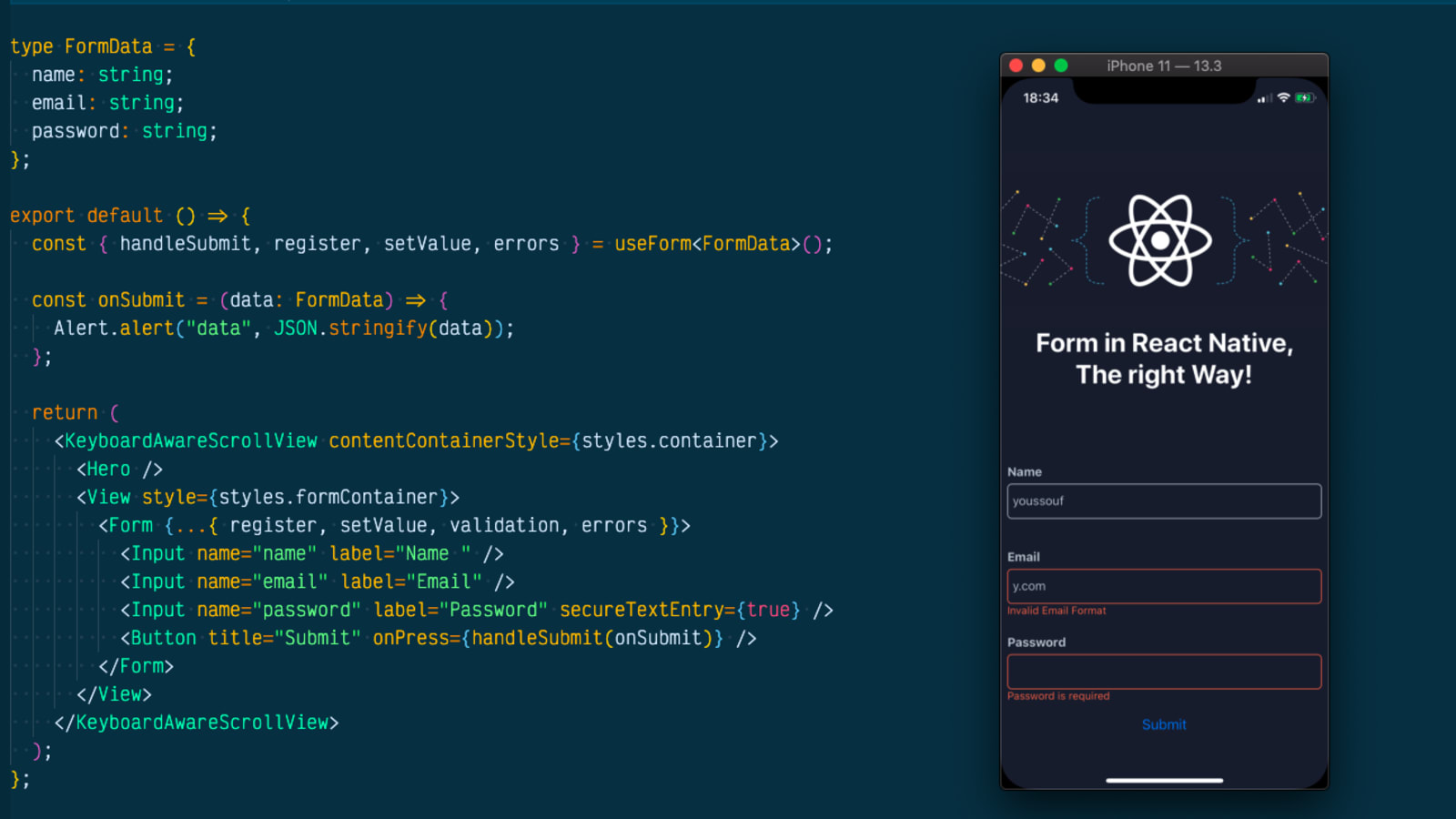
Advantages:
- Provides a native-like user experience
- Supports hot-reloading, which allows developers to see changes in real-time
- Provides a rich library of pre-built components
- Offers excellent performance and speed
Disadvantages:
- Lacks support for older devices and platforms
- Requires a significant learning curve for developers who are not familiar with JavaScript
Flutter
Flutter is an open-source mobile application framework that allows developers to create high-performance apps for iOS and Android using a single codebase. Developed by Google, Flutter uses the Dart programming language to create apps that provide a native-like experience.

Advantages:
- Offers excellent performance and speed
- Provides a rich library of pre-built widgets and tools
- Supports hot-reloading, which allows developers to see changes in real-time
- Enables developers to create beautiful and responsive UIs
Disadvantages:
- Lacks third-party library support compared to other frameworks
- The learning curve can be steep for developers who are not familiar with Dart
Xamarin
Xamarin is a popular mobile application framework that allows developers to create cross-platform apps using C#. Developed by Microsoft, Xamarin uses a single codebase to create apps that work seamlessly across iOS, Android, and Windows.
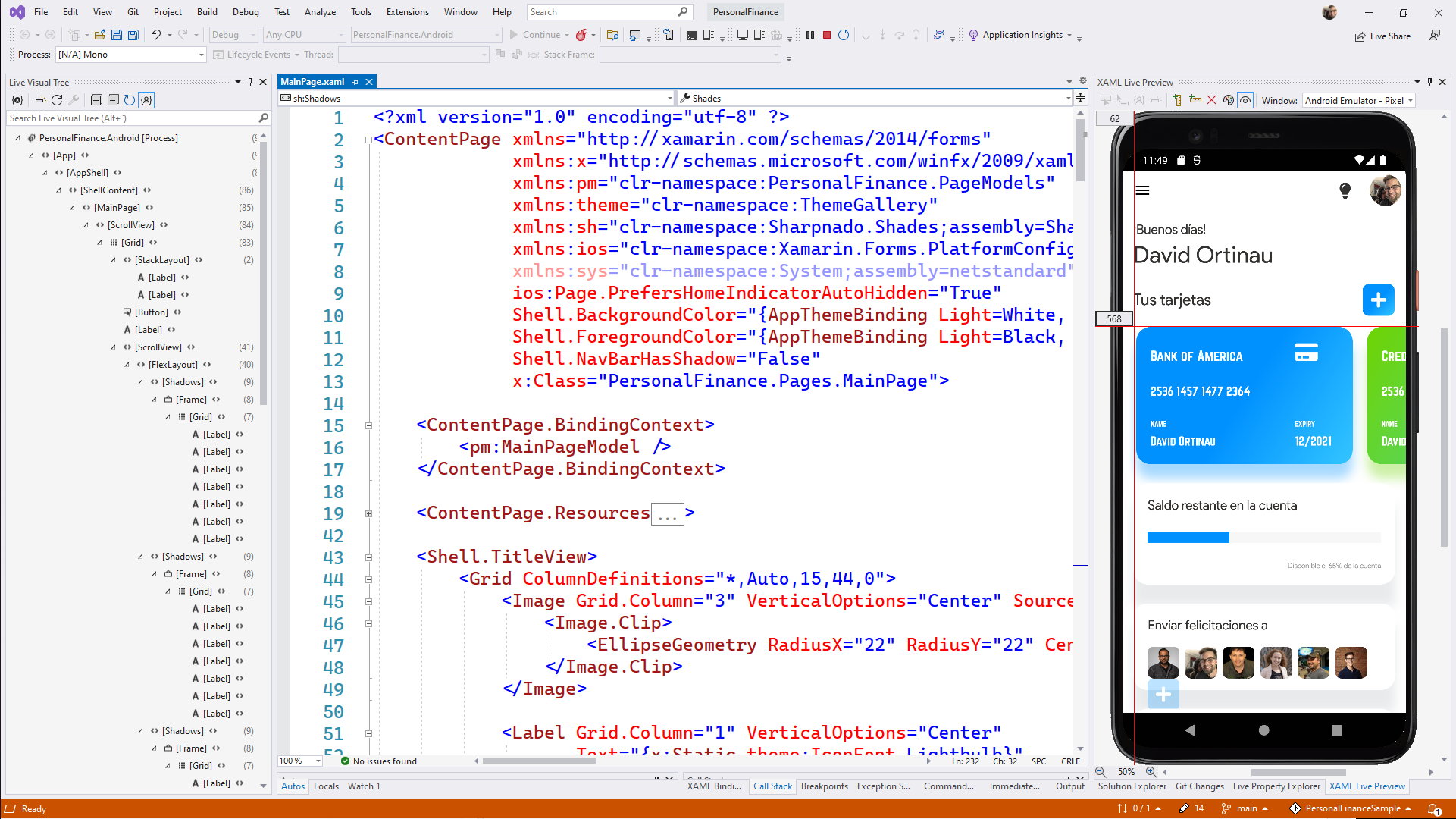
Advantages:
- Provides a native-like user experience
- Offers a rich library of pre-built components
- Supports third-party library integration
- Enables developers to create high-performance apps
Disadvantages:
- Lacks support for some native features
- The size of the app can be larger compared to other frameworks
Ionic
Ionic is an open-source mobile application framework that allows developers to create hybrid apps using HTML, CSS, and JavaScript. Developed by the Ionic team, Ionic offers a rich library of pre-built components and tools to create cross-platform apps that work seamlessly across different devices and platforms.

Advantages:
- Offers a rich library of pre-built components and tools
- Enables developers to create cross-platform apps using web technologies
- Supports third-party library integration
- Provides a fast and efficient development experience
Disadvantages:
- May not provide a native-like experience compared to other frameworks
- Performance can be an issue with complex apps
PhoneGap
PhoneGap is an open-source mobile application framework that allows developers to create hybrid apps using HTML, CSS, and JavaScript. Developed by Adobe, PhoneGap offers a simple and easy-to-use development environment to create cross-platform apps that work seamlessly across different devices and platforms.

Advantages:
- Enables developers to create cross-platform apps using web technologies
- Provides a simple and easy-to-use development environment
- Supports third-party library integration
- Offers a rich library of pre-built components and tools
Disadvantages:
- May not provide a native-like experience compared to other frameworks
- Performance can be an issue with complex apps
- Lacks support for some native features
Conclusion:
Mobile application frameworks have become an essential part of the app development process, enabling developers to create cross-platform apps that work seamlessly across different devices and platforms. Each of the frameworks mentioned in this article has its own advantages and disadvantages, and the choice of framework depends on the specific needs and requirements of the project.
React Native is one of the most popular mobile application frameworks, as it allows developers to create native apps using JavaScript and provides a rich library of pre-built components and tools. Flutter, on the other hand, uses Dart programming language and provides a fast and efficient development experience with its hot reload feature. Ionic is another popular framework that allows developers to create hybrid apps using web technologies like HTML, CSS, and JavaScript.
Ultimately, the choice of mobile application framework depends on the specific needs and requirements of the project, as well as the skill set of the development team. It is important to carefully consider the advantages and disadvantages of each framework before making a decision.
In conclusion, mobile application frameworks are essential tools for creating high-quality cross-platform apps that work seamlessly across different devices and platforms. With a wide range of options available, developers have the flexibility to choose the framework that best suits their specific needs and requirements. By carefully evaluating the advantages and disadvantages of each framework, developers can make informed decisions that result in successful and effective mobile apps.

Rakesh Jhunjhunwala was brought dead to the hospital : Breach Candy CEO
Billonaire investor Rakesh Jhunjunwala , who was widely known as "INDIA's Warren Buffett" and the 'Big Bull'. Jhunjhunwala had recently attended the launch of commercial operations of Akasa Air on August 7, an airline co-founded by him and former Jet Airways CEO Vinay Dube.
Veteran investor Rakesh Jhunjhunwala , who passed away at the age of 62 on Sunday morning, was brought dead to the Mumbai hospital, Breach Candy Hospital CEO N Santhanam told The Indian Express.
Jhunjhunwala was suffering from diabetes and a kidney ailment, a doctor said. As per reports, he was admitted to the hospital a few days ago and later discharged.

As the seasons change, so do our taste buds. There's nothing quite like enjoying a meal made with fresh, seasonal ingredients. From the crispness of fall apples to the brightness of spring greens, each season brings its own unique flavors and culinary delights. In this blog, we'll explore some of the most delicious seasonal eats for an awesome time.
Fall
Fall is the season of pumpkins, apples, and warm spices. It's the perfect time for hearty soups, stews, and roasted vegetables. Here are some delicious seasonal eats to try this fall:
- Pumpkin Soup: This creamy soup is made with roasted pumpkin, onions, and garlic. It's seasoned with warming spices like cinnamon, nutmeg, and ginger. Top it with a dollop of sour cream and some croutons for a cozy fall meal.
- Roasted Brussels Sprouts: Brussel sprouts are at their peak in the fall. Roast them with some olive oil, salt, and pepper until they're crispy and tender. Drizzle them with balsamic vinegar for a sweet and tangy finish.
- Apple Pie: Nothing says fall like a warm slice of apple pie. Use tart apples like Granny Smiths for the filling, and add plenty of cinnamon and nutmeg. Serve it with a scoop of vanilla ice cream for a classic fall dessert.

Winter
Winter is the season of comfort food. It's the time for hearty stews, warming soups, and rich, indulgent desserts. Here are some delicious seasonal eats to try this winter:
- Beef Stew: This classic comfort food is made with tender beef, root vegetables, and plenty of herbs and spices. It's the perfect meal to warm you up on a cold winter night.
- Hot Chocolate: There's nothing quite like a warm cup of hot chocolate on a chilly winter day. Make it extra decadent by adding a dollop of whipped cream and some chocolate shavings.
- Gingerbread Cookies: These spicy cookies are a winter staple. They're made with molasses, ginger, cinnamon, and cloves. Roll them out and cut them into festive shapes like snowflakes and gingerbread men.

Spring
Spring is the season of renewal and fresh starts. It's time for fresh greens, herbs, and bright, citrusy flavors. Here are some delicious seasonal eats to try this spring:
- Asparagus Salad: Asparagus is at its peak in the spring. Toss it with some mixed greens, shaved Parmesan, and a lemon vinaigrette for a light and refreshing salad.
- Lemon Bars: These tangy bars are the perfect dessert for spring. They're made with a buttery shortbread crust and a zesty lemon filling. Serve them with a dusting of powdered sugar for a sweet finish.
- Spring Pea Soup: This vibrant soup is made with fresh peas, mint, and vegetable broth. It's light and refreshing, perfect for a springtime lunch.

Summer
Summer is the season of abundance. It's time for juicy fruits, crisp vegetables, and refreshing drinks. Here are some delicious seasonal eats to try this summer:
- Caprese Salad: This classic salad is made with fresh tomatoes, basil, and mozzarella cheese. Drizzle it with olive oil and balsamic vinegar for a simple and delicious summer meal.
- Grilled Corn: Corn is at its peak in the summer. Grill it with some butter and salt until it's charred and tender. Serve it with a squeeze of lime juice for a bright and flavorful side dish.
- Watermelon Salad: This refreshing salad is made with juicy watermelon, feta cheese, and fresh mint
- Grilled Vegetables: Grilling vegetables bring out their natural sweetness and add a smoky flavor. Try grilling zucchini, bell peppers, and eggplant for a colorful and flavorful side dish.
- Iced Tea: Stay cool and refreshed with a glass of iced tea. Try brewing black tea with fresh mint leaves and lemon slices for a bright and flavorful summer drink.

In conclusion,
there's no better time to enjoy delicious, seasonal eats than right now. Whether it's a warm bowl of pumpkin soup in the fall, a refreshing watermelon salad in the summer, or a hearty beef stew in the winter, seasonal foods are always a good choice. Not only do they taste better, but they're also better for you and the planet. So, the next time you're at the grocery store or farmer's market, be sure to look for the freshest seasonal produce and get ready to enjoy some delicious meals.

In today's fast-paced world, students and professionals often find themselves overwhelmed by the demands of studying or working in an office job. The constant pressure to perform, meet deadlines, and achieve success can lead to irritability and stress. However, it is crucial to cultivate a sense of calm and find effective strategies to overcome irritability. In this blog, we will explore practical tips and techniques to help students and office workers conquer irritability, enhance focus, and improve overall well-being.

I. Understanding the Causes of Irritability:
Before delving into the solutions, it is essential to understand the root causes of irritability. Some common factors contributing to irritability in student study and office jobs include:
-
Stress: High levels of stress, whether due to academic expectations or workplace pressures, can trigger irritability.
-
Lack of Work-Life Balance: Failing to maintain a healthy balance between work/study and personal life can lead to irritability and burnout.
-
Poor Sleep Habits: Inadequate sleep or irregular sleep patterns can negatively impact mood and increase irritability.
-
Unhealthy Lifestyle Choices: Poor nutrition, sedentary habits, and lack of exercise can contribute to irritability and decreased mental resilience.
II. Strategies for Cultivating Calm:
-
Prioritize Self-Care: Make self-care a priority by incorporating activities that promote relaxation and well-being into your daily routine. This can include activities such as exercise, meditation, deep breathing exercises, or engaging in hobbies that bring joy and peace.
-
Establish Healthy Boundaries: Set clear boundaries between your study or work time and personal time. Avoid overworking or over-committing yourself, and learn to say no when necessary. This will help prevent overwhelm and reduce irritability.
-
Practice Mindfulness: Cultivate mindfulness by staying present in the moment and focusing on the task at hand. Mindfulness techniques, such as mindful breathing or body scans, can help reduce stress and improve focus, ultimately decreasing irritability.
-
Create a Supportive Environment: Surround yourself with positive influences, whether it's seeking support from friends, and family, or joining study groups or professional networks. Having a supportive environment can alleviate stress and provide a sense of belonging.
-
Time Management: Effective time management is crucial for reducing stress and irritability. Break down tasks into smaller, manageable segments, set realistic goals, and prioritize your workload. This approach will help you stay organized, reduce overwhelm, and enhance productivity.
-
Improve Sleep Habits: Establish a consistent sleep schedule, aiming for seven to eight hours of quality sleep each night. Create a calming bedtime routine, avoid electronic devices before bed, and ensure your sleep environment is comfortable and conducive to restful sleep.
-
Incorporate Physical Activity: Engage in regular physical activity to release endorphins, reduce stress, and improve overall well-being. Find activities that you enjoy, such as walking, yoga, or dancing, and make them a part of your routine.
-
Practice Emotional Regulation: Learn effective techniques to manage and express your emotions constructively. This can include journaling, talking to a trusted friend or therapist, or practicing relaxation techniques during stressful moments.
-
Seek Breaks and Relaxation: Incorporate short breaks and relaxation periods into your study or work schedule. Taking short walks, practicing deep breathing exercises, or engaging in activities that bring you joy can help alleviate stress and irritability.
-
Maintain a Healthy Lifestyle: Nourish your body with a balanced diet, stay hydrated, and limit the consumption of caffeine and sugary foods. A healthy body contributes to a calm mind.
III. Long-Term Strategies for Sustaining Calmness:
-
Practice Gratitude: Cultivate a mindset of gratitude by acknowledging and appreciating the positive aspects of your study or work experience. This mindset shift can help reduce irritability and enhance overall well-being.
-
Continual Learning and Skill Development: Invest in your personal and professional growth by acquiring new skills or knowledge. This can boost confidence, provide a sense of accomplishment, and reduce stress.
-
Regular Relaxation Techniques: Dedicate time each day to practice relaxation techniques such as progressive muscle relaxation, guided imagery, or listening to calming music. These practices can help you unwind, reduce tension, and maintain a sense of calmness.
-
Build Resilience: Focus on developing resilience to better cope with stress and adversity. This can involve reforming challenges as opportunities for growth, practicing self-compassion, and cultivating a positive mindset.
Conclusion:
Conquering irritability while studying or working in an office job is possible with the right strategies and mindset. By implementing the tips discussed in this blog, you can cultivate a sense of calmness, enhance focus, and improve overall well-being. Remember to prioritize self-care, manage your time effectively, and create a supportive environment. With dedication and consistency, you can thrive in your academic or professional pursuits while maintaining a state of calmness and contentment.

Krafton breaks silence on BGMI's removal from Google Play Store, Apple App Store
Battle-royale style game and a popular alternative to the banned PUBG Mobile, BGMI, or Battlegrounds Mobile India, has been quietly taken down from the Apple App Store and Google Play Store in India as of Saturday.
BGMI ban update: The company said the security and privacy of user data are paramount for it.
The company said the security and privacy of user data are paramount for it. It added that it has always complied with Indian laws.
"We are committed to the Indian market and are positive about the opportunities in the country. At Krafton Inc, the security and privacy of our user data are of utmost importance to us. We have always been compliant with all laws and regulations in India including data protection laws and regulations and will continue abiding by them," he added.
The reason for the removal is not known yet
Battlegrounds Mobile India, the Indian
version of the popular battle royale game PUBG Mobile recently crossed 100
million registered users in the country, just about a year after it was
relaunched as BGMI after PUBG Mobile was banned by the government in
India.
In February 2022, PRAHAR, an NGO urged the government to block the Chinese gaming app BGMI-PUBG and add it to the list of 54 Chinese apps banned on February 14, 2022, saying its omission from the list is a “clear lapse in judgment on part of the Government".

Serverless computing has revolutionized the way developers build, deploy, and scale applications. With serverless computing, developers no longer need to manage servers, infrastructure, or the operating system. Instead, they can focus on writing code and building applications that are scalable, efficient, and cost-effective.
AWS Lambda and API Gateway are two of the most popular serverless computing services provided by Amazon Web Services (AWS). In this blog, we will discuss the basics of serverless computing, AWS Lambda, and API Gateway, and how to use them to build a serverless web application.
Basics of Serverless Computing
Serverless computing is a cloud computing model in which the cloud provider manages the infrastructure and automatically allocates computing resources as needed. The key benefits of serverless computing are scalability, efficiency, and cost-effectiveness.
AWS Lambda
AWS Lambda is a serverless computing service provided by Amazon Web Services (AWS). It allows developers to run code without provisioning or managing servers. AWS Lambda functions can be used to process data, respond to events, and more. AWS Lambda supports a wide range of programming languages, including Node.js, Python, Java, Go, and Ruby.
API Gateway
AWS API Gateway is a fully managed service that makes it easy for developers to create, publish, and manage RESTful APIs. It integrates with AWS Lambda, allowing developers to create serverless APIs that can be used to build scalable web applications. API Gateway provides features such as authentication, authorization, and rate limiting, making it a powerful tool for building secure and efficient APIs.
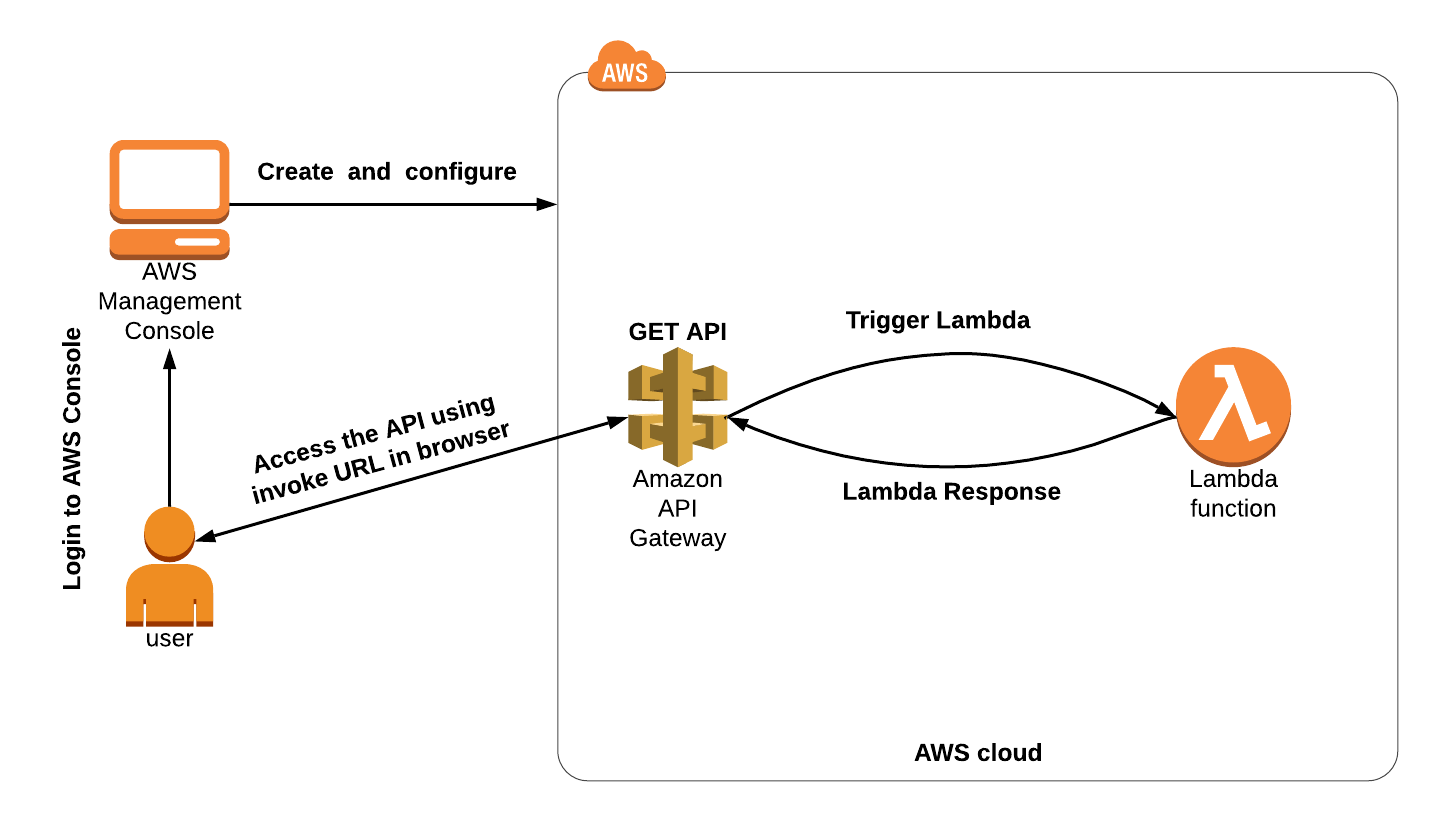
Building a Serverless Web Application with AWS Lambda and API Gateway Now that we have a basic understanding of serverless computing, AWS Lambda, and API Gateway, let's dive into building a serverless web application.
Step 1: Design your application architecture
The first step in building a serverless web application is to design your application architecture. This involves identifying the components of your application, such as the user interface, data storage, and API endpoints.
Step 2: Create AWS Lambda functions
The next step is to create AWS Lambda functions that will handle the logic of your application. AWS Lambda functions can be created using the AWS Management Console, AWS CLI, or a serverless framework such as Serverless or AWS SAM.
Step 3: Create API endpoints using API Gateway
Once your AWS Lambda functions are created, you can create API endpoints using API Gateway. API Gateway provides a web-based interface for creating, publishing, and managing RESTful APIs. You can use API Gateway to create API methods that map to your Lambda functions, define request and response models, and configure authentication and authorization.
Step 4: Deploy your application
After you have created your AWS Lambda functions and API endpoints, you can deploy your application to AWS. This involves creating a deployment package that includes your Lambda functions and API Gateway configuration and deploying it to AWS using the AWS Management Console or AWS CLI.
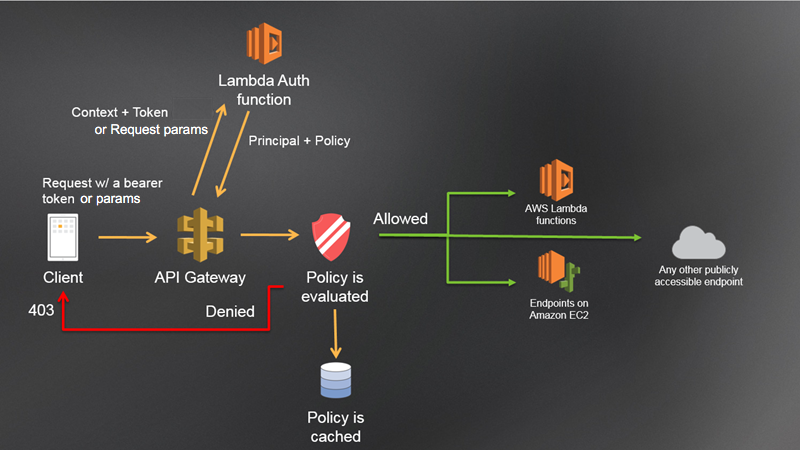
Best Practices for Serverless App Development
When developing serverless web applications with AWS Lambda and API Gateway, it is important to follow best practices to ensure that your application is scalable, efficient, and cost-effective. Here are some best practices to keep in mind:
-
Use the right tool for the job: AWS Lambda and API Gateway are powerful tools, but they may not be the best fit for every use case. Make sure to choose the right tool for the job.
-
Design for scalability: Design your application with scalability in mind. This includes using asynchronous programming, breaking your application into small, reusable functions, and using auto-scaling groups to handle traffic spikes.
-
Optimize for cost: Serverless computing can be cost-effective, but it's important to optimize your application for cost.
-
Use caching: Use caching to reduce the number of requests made to your application and improve performance. API Gateway supports caching, and you can also use services like Amazon ElastiCache or Amazon CloudFront to cache data.
-
Monitor and log: Serverless computing can make it more challenging to monitor and debug your application, so it's important to implement logging and monitoring. AWS CloudWatch can be used to monitor your Lambda functions and API Gateway, and you can also use third-party tools like New Relic or Datadog.
-
Secure your application: Security is important in any application, and serverless applications are no exception. Use AWS Identity and Access Management (IAM) to control access to your Lambda functions and API Gateway, and implement encryption to protect sensitive data.
Conclusion
Serverless computing has made it easier than ever for developers to build, deploy, and scale applications. AWS Lambda and API Gateway are two powerful tools that can be used to build serverless web applications. By following best practices and designing your application with scalability, efficiency, and cost-effectiveness in mind, you can build serverless applications that are highly performant and secure.
In conclusion, building a serverless web application with AWS Lambda and API Gateway is a great way to take advantage of the benefits of serverless computing. With these powerful tools, developers can focus on building great applications without the hassle of managing infrastructure or servers. By following best practices and designing your application with scalability, efficiency, and cost-effectiveness in mind, you can build highly performant and secure serverless applications that meet the needs of your users.
Click To Read On Global Platform - Medium
Read - How I got certified as AWS Developer Associate, Get Hands-On with AWS: Learn and Apply with these Practical Applications

The Indian Premier League, popularly known as the IPL, is one of the most exciting and lucrative cricket tournaments in the world. It was first launched in 2008 by the Board of Control for Cricket in India (BCCI) as a Twenty20 cricket tournament featuring eight teams representing different cities in India. Over the years, the tournament has grown in popularity, attracting some of the biggest names in cricket from around the world and turning into a global phenomenon.
One of the most exciting aspects of the IPL is the fierce competition between the teams, with each franchise vying for the coveted IPL trophy. The tournament follows a round-robin format, with each team playing a total of 14 matches in the league stage. The top four teams then qualify for the playoffs, which include two qualifier matches and an eliminator match before the final.
Over the years, several teams have emerged as top contenders for the IPL trophy. The Mumbai Indians, led by Rohit Sharma, are the most successful team in the tournament's history, having won the trophy a record five times. They first won the title in 2013 and have since gone on to win it four more times in 2015, 2017, 2019, and 2020.

The Chennai Super Kings, led by MS Dhoni, are the second-most successful team in IPL history, having won the title three times in 2010, 2011, and 2018. The Kolkata Knight Riders, led by Eoin Morgan, and the Sunrisers Hyderabad, led by Kane Williamson, have both won the IPL title twice.
Other teams that have won the IPL trophy include the Rajasthan Royals, who won the inaugural IPL in 2008, and the Deccan Chargers, who won the tournament in 2009. The Royal Challengers Bangalore, Kings XI Punjab, and Delhi Capitals are the only teams to have reached the IPL final without winning the tournament.
Cricket is a sport that unites people across the world, and nowhere is this more evident than in the Indian Premier League or IPL. Every year, the IPL brings together some of the best cricketers from around the world to compete for the coveted IPL trophy. The tournament is a true spectacle, with millions of fans tuning in to watch the action unfold.

Over the years, several teams have emerged as strong contenders for the IPL title. The Mumbai Indians, led by Rohit Sharma, are the most successful team in the tournament's history, having won the trophy a record five times. Their performances have been consistently impressive, with the team displaying a formidable combination of strong batting, disciplined bowling, and exceptional fielding.
The Chennai Super Kings, led by MS Dhoni, has also been a dominant force in the IPL, winning the title three times. The team is known for its consistency and strong leadership, with Dhoni leading from the front and inspiring his teammates to perform at their best.
Other teams that have performed well in the IPL include the Kolkata Knight Riders, led by Eoin Morgan, and the Sunrisers Hyderabad, led by Kane Williamson. Both teams have won the IPL twice and have consistently been in contention for the title.
The IPL is not just a battle for glory; it is also a platform for young and upcoming players to showcase their talent. Many players who have performed well in the IPL have gone on to represent their national teams and make a name for themselves in the world of cricket.
The IPL has also had a significant impact on the economy, with the tournament generating huge revenues for the BCCI and its franchise owners. The tournament has also provided a boost to local economies, with businesses benefiting from increased tourism and spending during the tournament.
The IPL has revolutionized cricket in many ways. It has not only brought a new format to the game but also created a platform for young and upcoming players to showcase their talent. The league has also attracted some of the biggest names in world cricket, including the likes of Virat Kohli, Rohit Sharma, MS Dhoni, and AB de Villiers.

The IPL has also been a massive success commercially. It is one of the richest cricket leagues in the world, with teams being bought for millions of dollars. The league has also created employment opportunities for thousands of people, including players, coaches, support staff, and groundsmen.
However, the IPL has not been without its controversies. The league has been embroiled in match-fixing scandals, with several players and officials being banned for their involvement. The league has also faced criticism for its impact on the environment, with concerns raised over the use of plastic and the carbon footprint created by the tournament.
Despite these controversies, the IPL remains one of the most exciting and popular cricket tournaments in the world. It has created a new generation of cricket fans, who are passionate about the game and the league. The IPL has also created a legacy that will continue to inspire and influence cricket for generations to come.
















